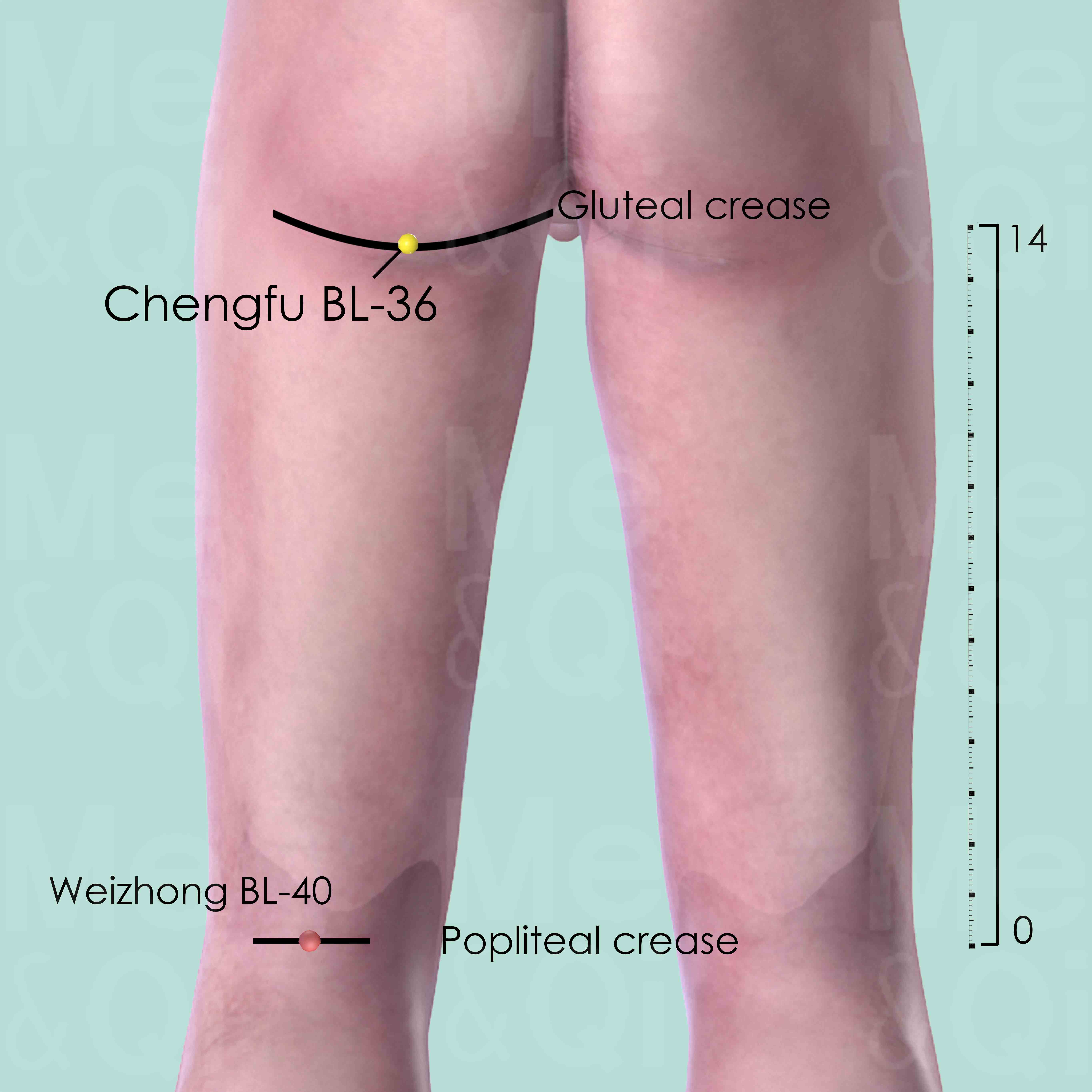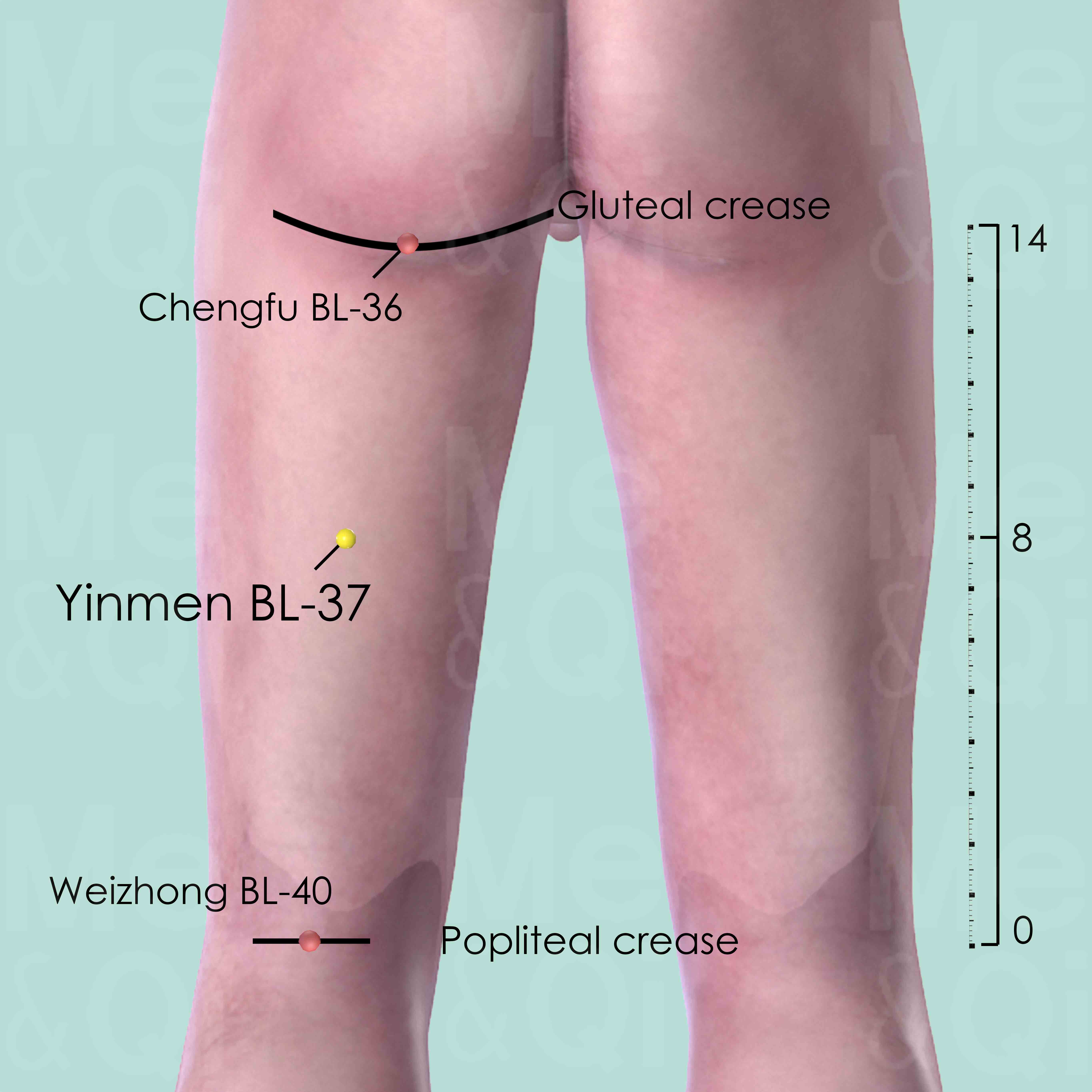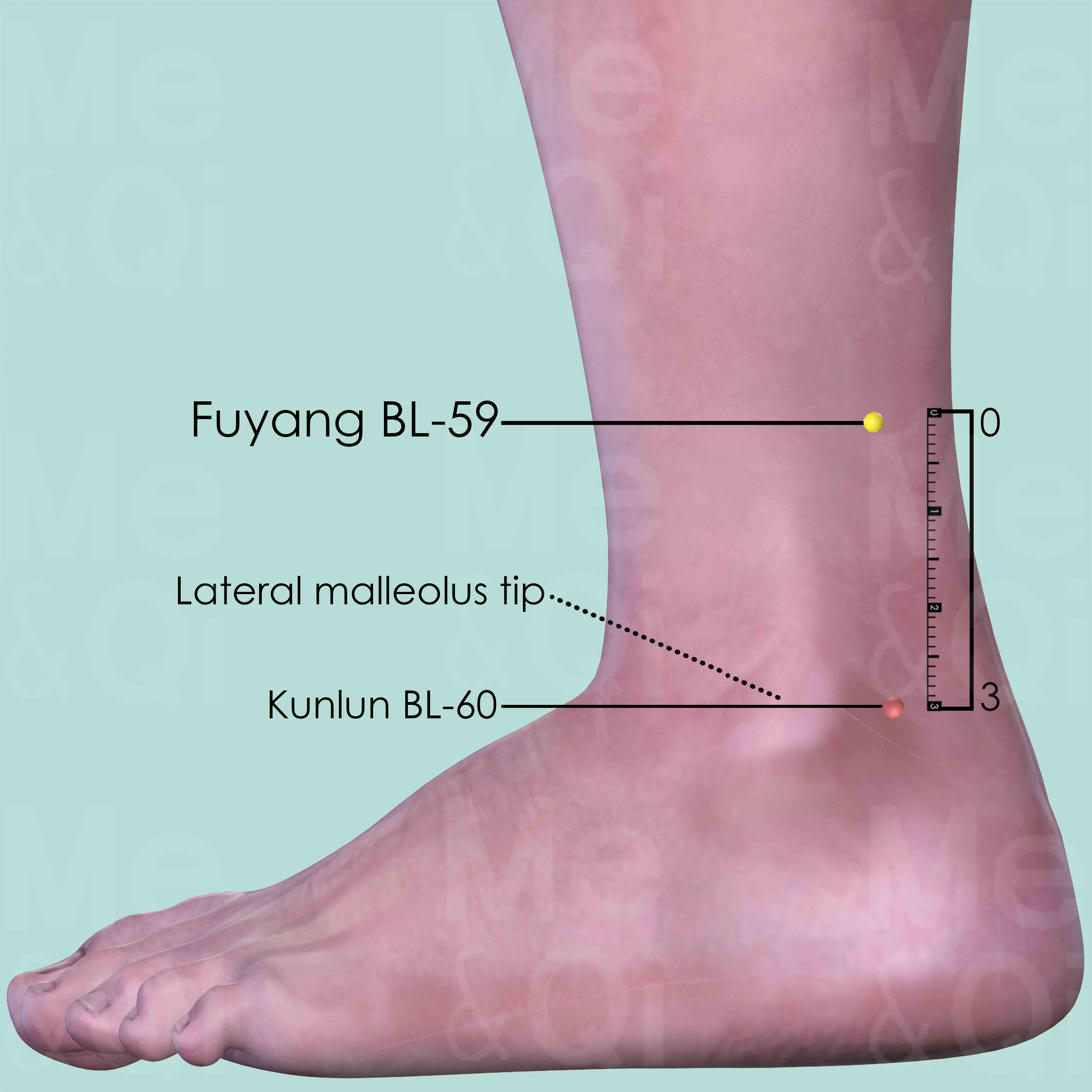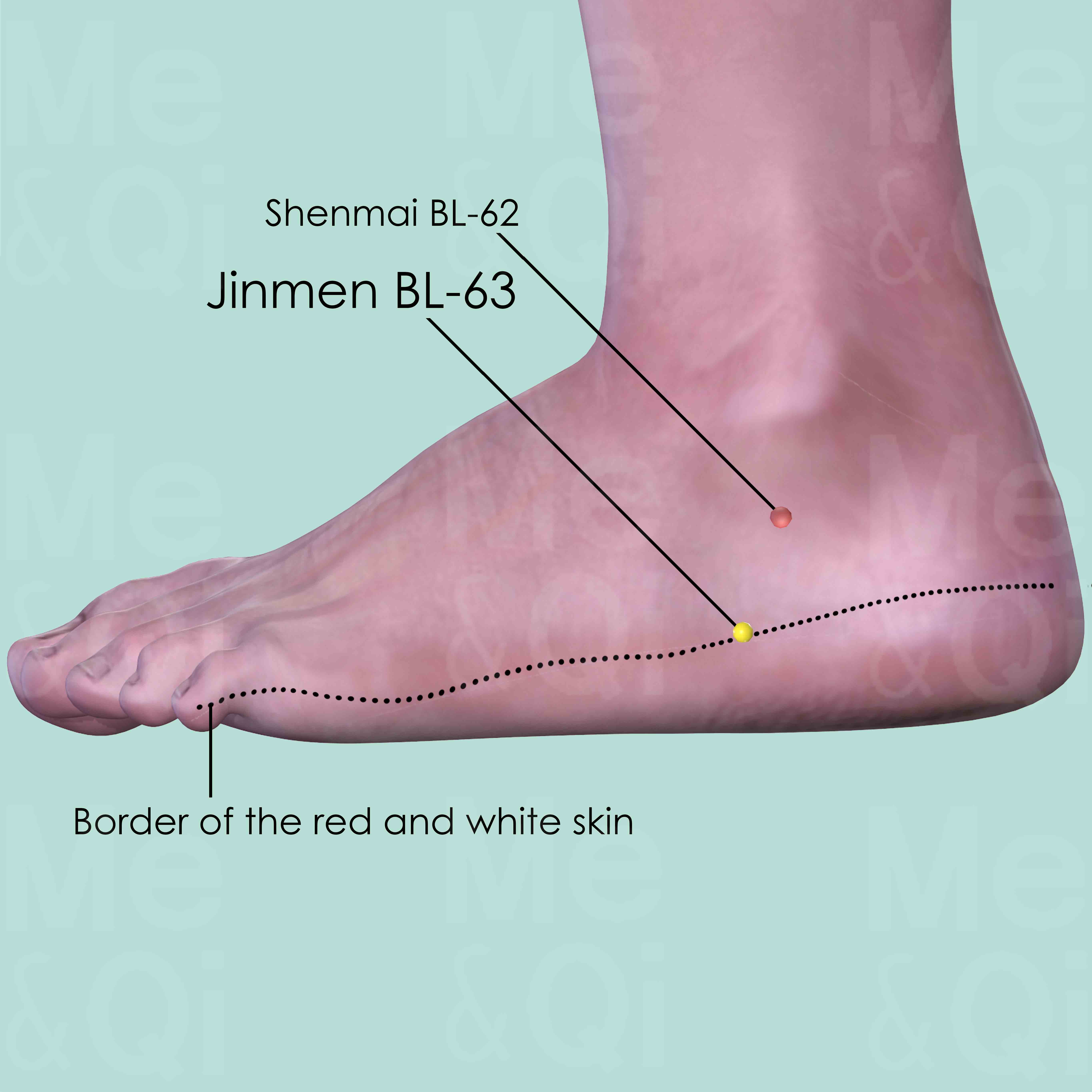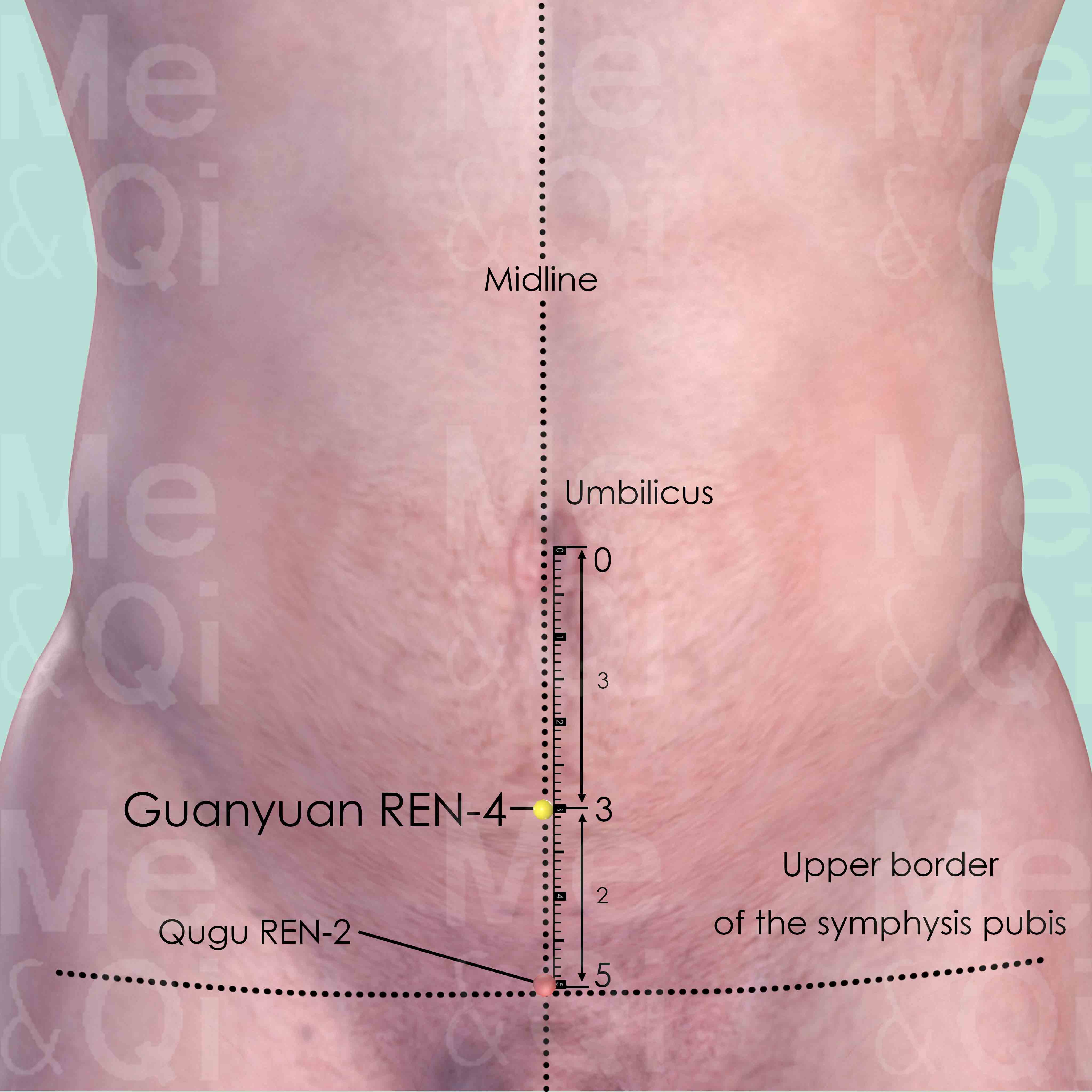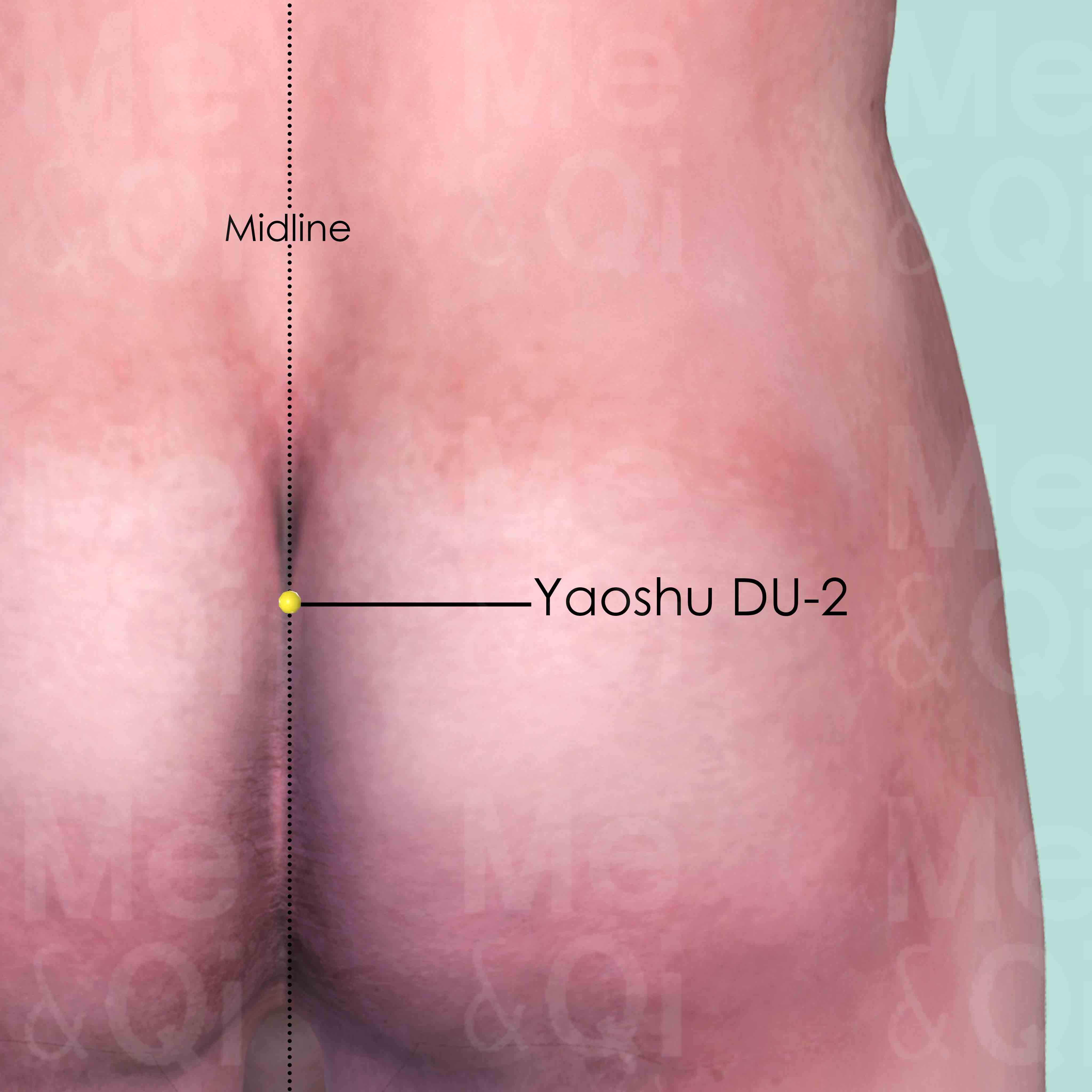Lower Back Painaccording to TCM
Symptom family: Back and Neck Pain
Parent symptom: Back Pain
Sub-symptom(s): Chronic Lower Back Pain
What is Lower Back Pain?
Lower back pain, also known as lumbago, is a common medical condition characterized by discomfort or pain in the lumbar region of the back. It can range from mild soreness to debilitating pain, impacting mobility and quality of life.
This condition can be acute or chronic and may be caused by a variety of factors including muscle or ligament strain, disc herniation, arthritis, or spinal irregularities. Chronic lower back pain, a persistent form of this ailment, often requires comprehensive management strategies for relief.
How Does TCM View Lower Back Pain?
Traditional Chinese Medicine (TCM) interprets lower back pain as a sign of imbalance in the body's internal energy systems. Unlike Western medicine, which often focuses on physical causes, TCM considers both physical and energetic factors.
It attributes lower back pain to disruptions in the flow of Qi (vital energy) and Blood, or imbalances in Yin and Yang energies. According to TCM, identifying and treating the underlying pattern of disharmony is crucial for effectively addressing lower back pain.
Root Causes of Lower Back Pain in TCM
In TCM, lower back pain is often linked to patterns like Yin Deficiency andYang Deficiency. For example, Kidney and Liver Yin Deficiency might manifest as lower back pain accompanied by symptoms like dizziness and tinnitus.
Similarly, Kidney Yang Deficiency could present with lower back soreness along with coldness in the back and fatigue. Other patterns like Heat, including Toxic-Heat or Kidney Yin Deficiency With Empty-Heat Blazing, can also contribute to lower back pain, each displaying unique symptoms and requiring different TCM treatments.
Explore below more details about what might cause Lower back pain according to TCM.
- By Syndrome
- By Organ
- Yin Deficiency
- Heat
- Yang Deficiency
- Cold
- Dampness
- Blood Deficiency
- Essence Deficiency
- Qi Deficiency
- Blood Stasis
- Yang Excess
- Qi Stagnation
- Wind
- View More Causes
- Kidney
- Liver
- Bladder
- Spleen
- Heart
- Lung
- View More Organs
Yin Deficiency
Yin deficiency in TCM is a pattern of disharmony characterized by a depletion of the body's Yin energy, which represents the cooling, moistening, and nurturing aspects of our physiology. This condition often arises from factors like chronic stress, overwork, insufficient rest, or prolonged illness. Symptoms of Yin deficiency can include a sensation of heat, especially in the afternoon or evening, night sweats, insomnia, a dry mouth or throat, and a red tongue with little coating. There might also be a general feeling of restlessness or irritability. Since Yin is essential for balancing the body's active and warm Yang energy, its deficiency leads to a relative excess of Yang, manifesting as heat or dryness symptoms.... see more
Yin Deficiency Patterns That Can Lead to Lower Back Pain
Common Symptoms: Dizziness Tinnitus Insomnia Dry Throat Night Sweats Dry Mouth Hearing Loss Blurry Vision
| Pattern Name | Relevant Symptoms | Relevant Formulas |
|---|---|---|
| Kidney and Liver Yin Deficiency | Lower back pain, Soreness and weakness in the lower back, Dizziness, Tinnitus, Hearing loss, Vertical headaches, Occipital headache, Insomnia, Limb numbness, Tingling of limbs, Dry eyes, Blurry vision, Dry throat, Dry hair, Skin dryness, Withered and brittle nails, Vaginal dryness, Night sweats, Dry stools, Nocturnal emission, Scanty menstruation, Amenorrhea, Late menstruation, Infertility... see more | Liu Wei Di Huang Wan | He Che Da Zao Wan | Tiao Gan Tang | Gui Shao Di Huang Tang | Zuo Gui Yin | Si Wu Tang | Zuo Gui Wan | Qi Ju Di Huang Wan | Qing Gu San | Yi Guan Jian | Ming Mu Di Huang Wan |
| Kidney and Lung Yin Deficiency | Lower back pain, Dizziness, Tinnitus, Night dry coughing, Dry throat, Dry mouth, Emaciation, Exertional dyspnea, Night sweats, Hearing loss, Oliguria... see more | Ba Xian Chang Shou Wan |
| Kidney Yin Deficiency | Lower back pain, Perspiration, Back pain, Hearing loss, Dry mouth and throat at night, Constipation, Scanty and dark urine, Infertility, Premature ejaculation, Generalized fatigue, General weakness, Depression, Anxiety, Heat sensation in palms, Evening heat sensation, Flushed cheekbones, Menopausal hot flashes, Preference for sipping, Evening anxiety... see more | Liu Wei Di Huang Wan | Zuo Gui Wan | Qi Bao Mei Ran Dan | Zhi Bo Di Huang Wan | Bai Zi Yang Xin Tang |
| Kidney Yin Deficiency With Empty-Heat Blazing | Lower back pain, Flushed cheekbones, Restlessness, Insomnia, Night sweats, Low grade fever in the afternoon, Heat sensation in palms, Afternoon heat sensation, Evening heat sensation, Scanty and dark urine, Hematuria, Dry throat, Preference for sipping, Dizziness, Tinnitus, Hearing loss, Nocturnal emission, Hypersexuality, Dry stools... see more | Liu Wei Di Huang Wan | Zhi Bo Di Huang Wan |
| Disharmony between Heart and Kidneys | Soreness and weakness in the lower back, Dizziness, Tinnitus, Insomnia, Palpitations, Poor memory, Lower back pain, Knee pain, Night sweats, Constipation, Menopausal hot flashes... see more | Liu Wei Di Huang Wan | Tian Wang Bu Xin Dan |
| Deficiency of the Liver and Kidney Yin | Soreness and weakness in the lower back, Sore knees, Lower back pain, Knee weakness, Dry mouth, Dry tongue, Dizziness, Blurry vision, Insomnia, Vivid dreaming, Hair graying... see more | Er Zhi Wan |
Heat
In TCM "Heat" signifies an excess of Yang energy, leading to an imbalance where heat predominates over the body's cool Yin aspects. This condition is metaphorically akin to an internal over-heating. Symptoms indicative of Heat can include feelings of warmth, fever, sweating, irritability, red face, thirst with a preference for cold drinks, and a rapid pulse. The tongue may appear red with a yellow coating. Unlike the common interpretation of heat in terms of temperature, in TCM, it represents a state of hyperactivity or inflammation in the body.... see more
Heat Patterns That Can Lead to Lower Back Pain
Common Symptoms: Scanty And Dark Urine Dry Mouth Dry Throat Restlessness Dizziness Fever Thirst Constipation
| Pattern Name | Relevant Symptoms | Relevant Formulas |
|---|---|---|
| Toxic-Heat | Lower back pain, Fever, Edema, Pus and discharge, Boils, Carbuncles, Pustule, Red skin eruptions, Sore throat, Eczema, Perineum swollen, Prostate swollen, Testicular swelling, Mouth ulcers, Tonsil swelling... see more | Wu Wei Xiao Du Yin |
| Kidney Yin Deficiency With Empty-Heat Blazing | Lower back pain, Flushed cheekbones, Restlessness, Insomnia, Night sweats, Low grade fever in the afternoon, Heat sensation in palms, Afternoon heat sensation, Evening heat sensation, Scanty and dark urine, Hematuria, Dry throat, Preference for sipping, Dizziness, Tinnitus, Hearing loss, Nocturnal emission, Hypersexuality, Dry stools... see more | Liu Wei Di Huang Wan | Zhi Bo Di Huang Wan |
| Damp-Heat | Sore lower back, Fever, Neck gland swelling, Headaches, Tight feeling in chest and stomach, Sticky taste in the mouth, Absence of thirst, Feeling hot, Feeling of heaviness, Bitter taste in the mouth, Acne... see more | Er Miao San | Xiao Yao San | Qing Re Tiao Xue Tang |
| Damp-Heat in the Lower Burner | Lower back pain, Scanty and yellow urine, Weakness of lower extremities, Red and swollen feet, Swollen knee, Thick greasy vaginal secretions, Ulcers on the lower limbs, Scanty and dark urine, Painful urination, Dry mouth, Dry throat... see more | Er Miao San |
| Disharmony between Heart and Kidneys | Soreness and weakness in the lower back, Dizziness, Tinnitus, Insomnia, Palpitations, Poor memory, Lower back pain, Knee pain, Night sweats, Constipation, Menopausal hot flashes... see more | Liu Wei Di Huang Wan | Tian Wang Bu Xin Dan |
Yang Deficiency
Yang deficiency in TCM refers to a state where the body's Yang energy, which is responsible for warmth, activity, and function, is weakened or diminished. This pattern of disharmony often arises from chronic illness, aging, or inherent constitutional weakness. Symptoms of Yang deficiency are typically associated with cold and sluggishness, such as a feeling of coldness, cold extremities, pale complexion, low energy or fatigue, and a desire for warmth. Digestive issues like poor appetite, loose stools, and water retention can also be indicative of Yang deficiency.... see more
Yang Deficiency Patterns That Can Lead to Lower Back Pain
Common Symptoms: Chills Weak And Cold Knees Lower Back Coldness Weak Legs Bright Pale Face Generalized Fatigue General Weakness Leg Edema
| Pattern Name | Relevant Symptoms | Relevant Formulas |
|---|---|---|
| Kidney Yang Deficiency | Lower back pain, Sore lower back, Soreness and weakness in the lower back, Dizziness, Tinnitus, Weak and cold knees, Lower back coldness, Chills, Weak legs, Bright pale face, Generalized fatigue, General weakness, Leg edema, Female infertility, Diarrhea, Depression, Erectile dysfunction, Premature ejaculation, Oligospermia, Low sex drive, Pale and abudant urination, Constipation... see more | Ji Sheng Shen Qi Wan | Wu Zi Yan Zong Wan | Tu Si Zi Wan | Ba Wei Di Huang Wan | You Gui Wan | Er Xian Tang | Shen Qi Wan | Ji Chuan Jian |
| Kidney and Spleen Yang Deficiency | Lower back pain, Weak and cold knees, Back cold sensation, Chills, Weak legs, Bright pale face, Erectile dysfunction, Premature ejaculation, Oligospermia, Watery ejaculate, Low sex drive, Generalized fatigue, General weakness, Clear urination, Nocturia, Apathy, Leg edema, Female infertility, Diarrhea, Depression, Lack of appetite, Slight abdominal distention, Desire to lie down... see more | Li Zhong Wan |
| Wind-Cold invading with Yang Deficiency | Soreness of the lower back, Lower back pain, Low grade fever, Severe chills, Exhaustion, Hypersomnia, Cold extremities, Lumbar pain, Lower back coldness, General cold feeling, Lack of sweating, Headaches, Weak voice... see more | Ma Huang Xi Xin Fu Zi Tang | Zai Zao San |
| Kidney Yang Deficiency with Water overflowing | Soreness of the lower back, Edema of the lower extremities, Cold sensation in legs and back, Abdominal distention, Lumbar pain, Chills, Scanty clear urination, Palpitations, Shortness of breath, Cold hands, White and watery sputum, Coughing, Asthma... see more | Ji Sheng Shen Qi Wan | Wu Ling San |
Cold
In TCM "Cold" as a pattern of disharmony refers to a specific type of imbalance within the body's systems, often linked to a deficiency or weakness. It's not about feeling physically cold or having a common cold, but rather a metaphorical description of certain symptoms and underlying conditions. When a TCM practitioner says someone suffers from "Cold," it usually implies that the body's Yang energy, which is warm and active, is insufficient or overpowered by Yin energy, which is cool and passive. Symptoms of Cold in TCM can include a general feeling of coldness, cold limbs, pale complexion, low energy, slow metabolism, and a preference for warmth. ... see more
Cold Patterns That Can Lead to Lower Back Pain
Common Symptoms: Frequent Urination Urinary Or Fecal Incontinence Enuresis Dizziness Nocturia White Urethral Discharge Chills Pale And Abudant Urination
| Pattern Name | Relevant Symptoms | Relevant Formulas |
|---|---|---|
| Bladder Deficient and Cold | Lower back pain, Frequent urination, Pale and abudant urination, Urinary or fecal incontinence, Enuresis, Dizziness, Nocturia, White urethral discharge, Chills... see more | Sang Piao Xiao San | Suo Quan Wan |
| Wind-Cold invading with Yang Deficiency | Soreness of the lower back, Lower back pain, Low grade fever, Severe chills, Exhaustion, Hypersomnia, Cold extremities, Lumbar pain, Lower back coldness, General cold feeling, Lack of sweating, Headaches, Weak voice... see more | Ma Huang Xi Xin Fu Zi Tang | Zai Zao San |
| Bladder Deficiency with Cold | Lower back pain, Confusion, Poor memory, Urinary or fecal incontinence, Dizziness, White urethral discharge, Chills, Frequent urination, Cloudy urine, Pediatric nocturnal enuresis, Diabetes... see more | Sang Piao Xiao San |
| Blood Stagnation in the Lower Burner caused by Cold | Lower back pain, Abdominal masses, Lower abdominal pain, Lower abdominal distension, Abnormal uterine bleeding, Menstrual cramps, Dark menstrual clots... see more | Shao Fu Zhu Yu Tang |
Dampness
"Dampness" in TCM is a concept that describes a pattern of disharmony where the body accumulates excess moisture. Imagine the heavy, sticky feeling you get on a very humid day; that's similar to what dampness feels like internally. It can manifest as a sense of heaviness, bloating, sluggishness, or even a foggy mind. This condition is often thought to arise from environmental factors like living in a damp place, dietary habits that promote moisture in the body, or internal imbalances that hinder the body's ability to process fluids properly. In TCM, dampness can obstruct the normal flow of energy and fluids in the body, leading to various symptoms.... see more
Dampness Patterns That Can Lead to Lower Back Pain
Common Symptoms: Scanty And Dark Urine Dry Mouth Lower Abdominal Pain Scanty And Yellow Urine Weakness Of Lower Extremities Red And Swollen Feet Swollen Knee Thick Greasy Vaginal Secretions
| Pattern Name | Relevant Symptoms | Relevant Formulas |
|---|---|---|
| Kidney Yang Deficiency with Water overflowing | Soreness of the lower back, Edema of the lower extremities, Cold sensation in legs and back, Abdominal distention, Lumbar pain, Chills, Scanty clear urination, Palpitations, Shortness of breath, Cold hands, White and watery sputum, Coughing, Asthma... see more | Ji Sheng Shen Qi Wan | Wu Ling San |
| Damp-Heat | Sore lower back, Fever, Neck gland swelling, Headaches, Tight feeling in chest and stomach, Sticky taste in the mouth, Absence of thirst, Feeling hot, Feeling of heaviness, Bitter taste in the mouth, Acne... see more | Er Miao San | Xiao Yao San | Qing Re Tiao Xue Tang |
| Damp-Heat in the Lower Burner | Lower back pain, Scanty and yellow urine, Weakness of lower extremities, Red and swollen feet, Swollen knee, Thick greasy vaginal secretions, Ulcers on the lower limbs, Scanty and dark urine, Painful urination, Dry mouth, Dry throat... see more | Er Miao San |
Blood Deficiency
Blood Deficiency in TCM is like when your body's tank runs low on the vital energy that blood provides. It's not exactly the same as anemia in modern medicine, which is about having too few red blood cells. Instead, Blood Deficiency in TCM is about your body not having enough of the life-giving qualities that blood brings, like nourishment and moisture. This can make you feel tired, look pale, and even feel dizzy or have blurry vision. It's like a garden not getting enough water to stay lush and vibrant. TCM sees this as an imbalance where the body isn't being nourished as it should be, impacting overall health and well-being.... see more
Blood Deficiency Patterns That Can Lead to Lower Back Pain
Common Symptoms: Primary Amenorrhea Generalized Fatigue Knee Pain Dizziness Depression Amenorrhea Low Energy Chills
| Pattern Name | Relevant Symptoms | Relevant Formulas |
|---|---|---|
| Liver Blood and Kidney Essence Deficiency | Lower back pain, Primary amenorrhea, Generalized fatigue, Knee pain, Dizziness, Depression, Amenorrhea, Low energy, Chills, Dark face, Dry mouth... see more | Dang Gui Di Huang Yin | Liu Wei Di Huang Wan | He Che Da Zao Wan |
| Blood and Qi Deficiency with Blood Stagnation | Soreness and weakness in the lower back, Lack of appetite, Weak limbs, Lower back pain, Abdominal distention, Irregular periods, Red and white vaginal discharge, Infertility... see more | Ba Zhen Yi Mu Tang |
Essence Deficiency
In TCM "Essence" (Jing) deficiency refers to a depletion of the body's fundamental substance, which is vital for growth, development, reproduction, and overall vitality. Jing, often translated as "Essence," is a unique concept in TCM, seen as the basis of all life activities and inherited from our parents. Essence deficiency manifests in various symptoms, such as chronic fatigue, weakness, slow physical or mental development, fertility issues, premature aging, weak bones, and a lackluster complexion. It can also affect the hair, leading to premature greying or hair loss. This pattern of disharmony often arises from congenital factors, chronic illness, overwork, or excessive behaviors that drain the body's resources. ... see more
Essence Deficiency Patterns That Can Lead to Lower Back Pain
Common Symptoms: Primary Amenorrhea Dizziness Generalized Fatigue Knee Pain Depression Amenorrhea Low Energy Chills
| Pattern Name | Relevant Symptoms | Relevant Formulas |
|---|---|---|
| Kidney Essence Deficiency | Lower back pain, Deafness, Decreased mental sharpness, Intellectual disability, Osteomalacia, Hair loss, Infertility, Primary amenorrhea, Dizziness, Blurry vision, Absentmindness... see more | Zuo Gui Wan | Wu Zi Yan Zong Wan | Tu Si Zi Wan | Qi Bao Mei Ran Dan |
| Liver Blood and Kidney Essence Deficiency | Lower back pain, Primary amenorrhea, Generalized fatigue, Knee pain, Dizziness, Depression, Amenorrhea, Low energy, Chills, Dark face, Dry mouth... see more | Dang Gui Di Huang Yin | Liu Wei Di Huang Wan | He Che Da Zao Wan |
Qi Deficiency
Qi Deficiency in TCM is like running low on battery power. Qi is the vital energy that powers every function in your body. When there's a Qi Deficiency, it means your body doesn't have enough of this essential energy. This can make you feel tired all the time, weak, or even cause shortness of breath. It's similar to how you feel when you haven't had enough sleep or nutritious food. Your body just doesn't have the energy it needs to perform at its best. Unlike modern medicine, which often focuses on specific physical causes for fatigue and weakness, TCM views Qi Deficiency as an overall energy depletion that affects your entire well-being, and it seeks to replenish and balance this vital energy.... see more
Qi Deficiency Patterns That Can Lead to Lower Back Pain
Common Symptoms: Chills Generalized Fatigue Early Menstruation Pale Menstrual Flow Dizziness Nocturia Thin Menstrual Blood Shortness Of Breath
| Pattern Name | Relevant Symptoms | Relevant Formulas |
|---|---|---|
| Kidney Qi not Firm | Sore lower back, Lower back pain, Lower back weakness, Polyuria, Weak urine stream, Enuresis, Nocturnal emission, Generalized fatigue, Chills, Cold extremities, White vaginal discharge, Bearing down sensation in abdomen, Recurrent miscarriage... see more | Tu Si Zi Wan | You Gui Wan | Jin Suo Gu Jing Wan | Fu Tu Dan | Qing E Wan |
| Spleen or Kidney Qi Deficiency | Lower back pain, Early menstruation, Pale menstrual flow, Dizziness, Chills, Nocturia, Thin menstrual blood, Shortness of breath, Palpitations, Spontaneous sweat, Generalized fatigue... see more | He Che Da Zao Wan | Gui Pi Tang | Bu Zhong Yi Qi Tang |
Blood Stasis
Blood Stasis in TCM is a concept where the blood flow in the body is not as smooth or efficient as it should be. Imagine a river that's supposed to flow freely, but instead, it's getting blocked or moving too slowly in some parts. This can lead to various health issues, like pain that feels sharp or stabbing, dark bruises, and a complexion that looks purplish. TCM believes that good health relies on the smooth and vibrant flow of Qi and blood throughout the body, so when blood gets stuck, it's like a traffic jam in your body, leading to discomfort or health problems.... see more
Blood Stasis Patterns That Can Lead to Lower Back Pain
Common Symptoms: Abdominal Masses Lower Abdominal Pain Lower Abdominal Distension Abnormal Uterine Bleeding Menstrual Cramps Dark Menstrual Clots Lack Of Appetite Weak Limbs
| Pattern Name | Relevant Symptoms | Relevant Formulas |
|---|---|---|
| Blood Stagnation in the Lower Burner caused by Cold | Lower back pain, Abdominal masses, Lower abdominal pain, Lower abdominal distension, Abnormal uterine bleeding, Menstrual cramps, Dark menstrual clots... see more | Shao Fu Zhu Yu Tang |
| Blood and Qi Deficiency with Blood Stagnation | Soreness and weakness in the lower back, Lack of appetite, Weak limbs, Lower back pain, Abdominal distention, Irregular periods, Red and white vaginal discharge, Infertility... see more | Ba Zhen Yi Mu Tang |
Yang Excess
Yang Excess in TCM refers to a state where there is an overabundance of Yang energy, leading to symptoms of heat and hyperactivity in the body. This pattern of disharmony often arises from factors like stress, excessive physical activity, overconsumption of spicy or heating foods, or an internal imbalance that causes Yang to flare up. Symptoms of Yang Excess include a feeling of heat, red face, irritability, restlessness, thirst, constipation, and a rapid, forceful pulse. Treatment in TCM for Yang Excess aims to cool down and subdue the excessive Yang while nurturing Yin energy to restore balance.... see more
Yang Excess Patterns That Can Lead to Lower Back Pain
| Pattern Name | Relevant Symptoms | Relevant Formulas |
|---|---|---|
| Bladder Deficiency with Cold | Lower back pain, Confusion, Poor memory, Urinary or fecal incontinence, Dizziness, White urethral discharge, Chills, Frequent urination, Cloudy urine, Pediatric nocturnal enuresis, Diabetes... see more | Sang Piao Xiao San |
Qi Stagnation
Qi Stagnation in TCM is like having a traffic jam in your body's energy system. Qi, the vital life force that flows through your body, is supposed to move smoothly to maintain health and balance. But with Qi Stagnation, this flow gets blocked or slowed down, like cars stuck on a highway. This can lead to symptoms like feeling stressed, emotional mood swings, and physical discomfort, often described as a feeling of fullness or tightness, especially in the chest or abdomen. It's as though the body's internal energy circulation is disrupted, causing various issues. TCM sees this as an energy flow problem, different from modern medicine's focus on specific physiological processes.... see more
Qi Stagnation Patterns That Can Lead to Lower Back Pain
| Pattern Name | Relevant Symptoms | Relevant Formulas |
|---|---|---|
| Blood and Qi Deficiency with Blood Stagnation | Soreness and weakness in the lower back, Lack of appetite, Weak limbs, Lower back pain, Abdominal distention, Irregular periods, Red and white vaginal discharge, Infertility... see more | Ba Zhen Yi Mu Tang |
Wind
In TCM "Wind" is a concept that represents a pattern of disharmony, often characterized by its sudden and unpredictable nature, much like a gusty wind changing direction without warning. This pattern is associated with symptoms that come and go quickly or move around the body, such as itching, tremors, or even certain types of pain. Wind is considered to be a primary cause of illnesses that have these rapidly changing characteristics. In TCM, external Wind often refers to illnesses that start suddenly, like the common cold, believed to be caused by external pathogenic factors like climatic changes. On the other hand, internal Wind can be linked to internal imbalances and can manifest in conditions like dizziness or spasms. ... see more
Wind Patterns That Can Lead to Lower Back Pain
| Pattern Name | Relevant Symptoms | Relevant Formulas |
|---|---|---|
| Wind-Cold invading with Yang Deficiency | Soreness of the lower back, Lower back pain, Low grade fever, Severe chills, Exhaustion, Hypersomnia, Cold extremities, Lumbar pain, Lower back coldness, General cold feeling, Lack of sweating, Headaches, Weak voice... see more | Ma Huang Xi Xin Fu Zi Tang | Zai Zao San |
Kidney
In TCM the Kidneys are regarded as the body's most fundamental reservoir of Essence, known as Jing, which influences growth, reproduction, and aging. They are not just organs for filtering blood, but a holistic system governing vital life forces. When the Kidneys malfunction in TCM, it can manifest as a variety of health issues, such as chronic fatigue, reproductive problems, imbalances in fluid metabolism leading to edema or dryness, lower back pain, and a sense of fear or insecurity.... see more
Kidney Patterns That Can Lead to Lower Back Pain
Common Symptoms: Dizziness Tinnitus Night Sweats Generalized Fatigue Chills Dry Mouth Dry Throat Insomnia
| Pattern Name | Relevant Symptoms | Relevant Formulas |
|---|---|---|
| Kidney and Liver Yin Deficiency | Lower back pain, Soreness and weakness in the lower back, Dizziness, Tinnitus, Hearing loss, Vertical headaches, Occipital headache, Insomnia, Limb numbness, Tingling of limbs, Dry eyes, Blurry vision, Dry throat, Dry hair, Skin dryness, Withered and brittle nails, Vaginal dryness, Night sweats, Dry stools, Nocturnal emission, Scanty menstruation, Amenorrhea, Late menstruation, Infertility... see more | Liu Wei Di Huang Wan | He Che Da Zao Wan | Tiao Gan Tang | Gui Shao Di Huang Tang | Zuo Gui Yin | Si Wu Tang | Zuo Gui Wan | Qi Ju Di Huang Wan | Qing Gu San | Yi Guan Jian | Ming Mu Di Huang Wan |
| Kidney Yang Deficiency | Lower back pain, Sore lower back, Soreness and weakness in the lower back, Dizziness, Tinnitus, Weak and cold knees, Lower back coldness, Chills, Weak legs, Bright pale face, Generalized fatigue, General weakness, Leg edema, Female infertility, Diarrhea, Depression, Erectile dysfunction, Premature ejaculation, Oligospermia, Low sex drive, Pale and abudant urination, Constipation... see more | Ji Sheng Shen Qi Wan | Wu Zi Yan Zong Wan | Tu Si Zi Wan | Ba Wei Di Huang Wan | You Gui Wan | Er Xian Tang | Shen Qi Wan | Ji Chuan Jian |
| Kidney and Lung Yin Deficiency | Lower back pain, Dizziness, Tinnitus, Night dry coughing, Dry throat, Dry mouth, Emaciation, Exertional dyspnea, Night sweats, Hearing loss, Oliguria... see more | Ba Xian Chang Shou Wan |
| Kidney and Spleen Yang Deficiency | Lower back pain, Weak and cold knees, Back cold sensation, Chills, Weak legs, Bright pale face, Erectile dysfunction, Premature ejaculation, Oligospermia, Watery ejaculate, Low sex drive, Generalized fatigue, General weakness, Clear urination, Nocturia, Apathy, Leg edema, Female infertility, Diarrhea, Depression, Lack of appetite, Slight abdominal distention, Desire to lie down... see more | Li Zhong Wan |
| Kidney Essence Deficiency | Lower back pain, Deafness, Decreased mental sharpness, Intellectual disability, Osteomalacia, Hair loss, Infertility, Primary amenorrhea, Dizziness, Blurry vision, Absentmindness... see more | Zuo Gui Wan | Wu Zi Yan Zong Wan | Tu Si Zi Wan | Qi Bao Mei Ran Dan |
| Kidney Yin Deficiency | Lower back pain, Perspiration, Back pain, Hearing loss, Dry mouth and throat at night, Constipation, Scanty and dark urine, Infertility, Premature ejaculation, Generalized fatigue, General weakness, Depression, Anxiety, Heat sensation in palms, Evening heat sensation, Flushed cheekbones, Menopausal hot flashes, Preference for sipping, Evening anxiety... see more | Liu Wei Di Huang Wan | Zuo Gui Wan | Qi Bao Mei Ran Dan | Zhi Bo Di Huang Wan | Bai Zi Yang Xin Tang |
| Kidney Yin Deficiency With Empty-Heat Blazing | Lower back pain, Flushed cheekbones, Restlessness, Insomnia, Night sweats, Low grade fever in the afternoon, Heat sensation in palms, Afternoon heat sensation, Evening heat sensation, Scanty and dark urine, Hematuria, Dry throat, Preference for sipping, Dizziness, Tinnitus, Hearing loss, Nocturnal emission, Hypersexuality, Dry stools... see more | Liu Wei Di Huang Wan | Zhi Bo Di Huang Wan |
| Kidneys And Heart Not Harmonized | Lower back pain, Palpitations, Restlessness, Insomnia, Vivid dreaming, Anxiety, Poor memory, Dizziness, Tinnitus, Hearing loss, Nocturnal emissions with dreams, Evening heat sensation, Dry mouth and throat at night, Preference for sipping, Night sweats, Heat sensation in palms, Scanty and dark urine, Dry stools... see more | Bai Zi Yang Xin Tang | Tian Wang Bu Xin Dan | Jiao Tai Wan | Qing Xin Lian Zi Yin |
| Kidneys failing to receive Qi | Lower back pain, Exertional dyspnea, Rapid respiration, Weak respiratory, Difficulty breathing in, Chronic coughing, Asthma, Spontaneous sweat, Cold extremities, Facial edema, Emaciation, Low energy, Dizziness, Tinnitus, Clear urination... see more | You Gui Wan | Su Zi Jiang Qi Tang | Ren Shen Ge Jie San |
| Kidney Yang Deficiency with Water overflowing | Soreness of the lower back, Edema of the lower extremities, Cold sensation in legs and back, Abdominal distention, Lumbar pain, Chills, Scanty clear urination, Palpitations, Shortness of breath, Cold hands, White and watery sputum, Coughing, Asthma... see more | Ji Sheng Shen Qi Wan | Wu Ling San |
| Kidney Qi not Firm | Sore lower back, Lower back pain, Lower back weakness, Polyuria, Weak urine stream, Enuresis, Nocturnal emission, Generalized fatigue, Chills, Cold extremities, White vaginal discharge, Bearing down sensation in abdomen, Recurrent miscarriage... see more | Tu Si Zi Wan | You Gui Wan | Jin Suo Gu Jing Wan | Fu Tu Dan | Qing E Wan |
| Liver Blood and Kidney Essence Deficiency | Lower back pain, Primary amenorrhea, Generalized fatigue, Knee pain, Dizziness, Depression, Amenorrhea, Low energy, Chills, Dark face, Dry mouth... see more | Dang Gui Di Huang Yin | Liu Wei Di Huang Wan | He Che Da Zao Wan |
| Spleen or Kidney Qi Deficiency | Lower back pain, Early menstruation, Pale menstrual flow, Dizziness, Chills, Nocturia, Thin menstrual blood, Shortness of breath, Palpitations, Spontaneous sweat, Generalized fatigue... see more | He Che Da Zao Wan | Gui Pi Tang | Bu Zhong Yi Qi Tang |
| Disharmony between Heart and Kidneys | Soreness and weakness in the lower back, Dizziness, Tinnitus, Insomnia, Palpitations, Poor memory, Lower back pain, Knee pain, Night sweats, Constipation, Menopausal hot flashes... see more | Liu Wei Di Huang Wan | Tian Wang Bu Xin Dan |
| Deficiency of the Liver and Kidney Yin | Soreness and weakness in the lower back, Sore knees, Lower back pain, Knee weakness, Dry mouth, Dry tongue, Dizziness, Blurry vision, Insomnia, Vivid dreaming, Hair graying... see more | Er Zhi Wan |
Liver
In TCM the Liver is viewed as the organ responsible for the smooth flow of Qi, Blood, and emotions throughout the body. It plays a key role in regulating mood, storing blood, supporting digestion, and ensuring the health of tendons and eyes. When the Liver malfunctions or is imbalanced in TCM, it can lead to a range of issues such as irritability, mood swings, menstrual irregularities, eye problems, and muscular stiffness or pain. A malfunctioning Liver in TCM reflects not only physical disturbances but also emotional and mental disharmony, emphasizing the holistic approach of TCM in addressing health and wellness.... see more
Liver Patterns That Can Lead to Lower Back Pain
Common Symptoms: Dizziness Dry Mouth Generalized Fatigue Amenorrhea Dry Throat Night Sweats Skin Dryness Insomnia
| Pattern Name | Relevant Symptoms | Relevant Formulas |
|---|---|---|
| Kidney and Liver Yin Deficiency | Lower back pain, Soreness and weakness in the lower back, Dizziness, Tinnitus, Hearing loss, Vertical headaches, Occipital headache, Insomnia, Limb numbness, Tingling of limbs, Dry eyes, Blurry vision, Dry throat, Dry hair, Skin dryness, Withered and brittle nails, Vaginal dryness, Night sweats, Dry stools, Nocturnal emission, Scanty menstruation, Amenorrhea, Late menstruation, Infertility... see more | Liu Wei Di Huang Wan | He Che Da Zao Wan | Tiao Gan Tang | Gui Shao Di Huang Tang | Zuo Gui Yin | Si Wu Tang | Zuo Gui Wan | Qi Ju Di Huang Wan | Qing Gu San | Yi Guan Jian | Ming Mu Di Huang Wan |
| Liver Blood and Kidney Essence Deficiency | Lower back pain, Primary amenorrhea, Generalized fatigue, Knee pain, Dizziness, Depression, Amenorrhea, Low energy, Chills, Dark face, Dry mouth... see more | Dang Gui Di Huang Yin | Liu Wei Di Huang Wan | He Che Da Zao Wan |
| Deficiency of the Liver and Kidney Yin | Soreness and weakness in the lower back, Sore knees, Lower back pain, Knee weakness, Dry mouth, Dry tongue, Dizziness, Blurry vision, Insomnia, Vivid dreaming, Hair graying... see more | Er Zhi Wan |
Bladder
In TCM the Bladder plays a crucial role beyond its basic function of storing and excreting urine. It is intimately connected with the Kidney system, helping to regulate the body's water balance and being a key component in the processing and elimination of fluids. The Bladder also influences the lower part of the body and the back. When it malfunctions or is imbalanced in TCM, it can lead to urinary issues like frequent urination, incontinence, or painful urination. Additionally, there may be problems related to its meridian pathway, such as lower back pain, stiffness, or weakness in the legs. The Bladder’s condition in TCM can also reflect emotional states, with imbalances potentially leading to feelings of fear or anxiety.... see more
Bladder Patterns That Can Lead to Lower Back Pain
Common Symptoms: Frequent Urination Urinary Or Fecal Incontinence Enuresis Dizziness Nocturia White Urethral Discharge Chills Pale And Abudant Urination
| Pattern Name | Relevant Symptoms | Relevant Formulas |
|---|---|---|
| Bladder Deficient and Cold | Lower back pain, Frequent urination, Pale and abudant urination, Urinary or fecal incontinence, Enuresis, Dizziness, Nocturia, White urethral discharge, Chills... see more | Sang Piao Xiao San | Suo Quan Wan |
| Bladder Deficiency with Cold | Lower back pain, Confusion, Poor memory, Urinary or fecal incontinence, Dizziness, White urethral discharge, Chills, Frequent urination, Cloudy urine, Pediatric nocturnal enuresis, Diabetes... see more | Sang Piao Xiao San |
Spleen
In TCM the Spleen plays a vital role in digestion and transformation, converting food into energy and nutrients, and overseeing the distribution of Qi and Blood. It's also crucial in maintaining the health of muscles and limbs and ensuring the blood remains within the vessels. When the Spleen malfunctions in TCM, it can lead to a variety of issues such as digestive disorders, fatigue, weak muscles, bloating, and a feeling of heaviness. It can also cause a pale complexion, poor appetite, and a tendency to bruise easily. Emotionally, a Spleen imbalance is often associated with excessive worry or overthinking, reflecting its role in the interplay between physical and mental health.... see more
Spleen Patterns That Can Lead to Lower Back Pain
Common Symptoms: Chills Nocturia Generalized Fatigue General Weakness Early Menstruation Pale Menstrual Flow Dizziness Thin Menstrual Blood
| Pattern Name | Relevant Symptoms | Relevant Formulas |
|---|---|---|
| Kidney and Spleen Yang Deficiency | Lower back pain, Weak and cold knees, Back cold sensation, Chills, Weak legs, Bright pale face, Erectile dysfunction, Premature ejaculation, Oligospermia, Watery ejaculate, Low sex drive, Generalized fatigue, General weakness, Clear urination, Nocturia, Apathy, Leg edema, Female infertility, Diarrhea, Depression, Lack of appetite, Slight abdominal distention, Desire to lie down... see more | Li Zhong Wan |
| Spleen or Kidney Qi Deficiency | Lower back pain, Early menstruation, Pale menstrual flow, Dizziness, Chills, Nocturia, Thin menstrual blood, Shortness of breath, Palpitations, Spontaneous sweat, Generalized fatigue... see more | He Che Da Zao Wan | Gui Pi Tang | Bu Zhong Yi Qi Tang |
Heart
In TCM the Heart is considered the "emperor" of all organs, primarily responsible for governing Blood and housing the mind, known as "Shen." It plays a crucial role in maintaining mental-emotional equilibrium and controlling the circulation of Qi and blood throughout the body. When the Heart is imbalanced or malfunctions in TCM, it can lead to a range of issues like heart palpitations, insomnia, dream-disturbed sleep, anxiety, and a flushed complexion. Emotional disturbances such as excessive joy or lack of joy are also seen as signs of Heart disharmony. These symptoms reflect not just physical heart conditions but also the state of one's Shen, indicating the interconnectedness of physical and emotional well-being in TCM.... see more
Heart Patterns That Can Lead to Lower Back Pain
Common Symptoms: Palpitations Restlessness Insomnia Anxiety Poor Memory Dizziness Tinnitus Night Sweats
| Pattern Name | Relevant Symptoms | Relevant Formulas |
|---|---|---|
| Kidneys And Heart Not Harmonized | Lower back pain, Palpitations, Restlessness, Insomnia, Vivid dreaming, Anxiety, Poor memory, Dizziness, Tinnitus, Hearing loss, Nocturnal emissions with dreams, Evening heat sensation, Dry mouth and throat at night, Preference for sipping, Night sweats, Heat sensation in palms, Scanty and dark urine, Dry stools... see more | Bai Zi Yang Xin Tang | Tian Wang Bu Xin Dan | Jiao Tai Wan | Qing Xin Lian Zi Yin |
| Disharmony between Heart and Kidneys | Soreness and weakness in the lower back, Dizziness, Tinnitus, Insomnia, Palpitations, Poor memory, Lower back pain, Knee pain, Night sweats, Constipation, Menopausal hot flashes... see more | Liu Wei Di Huang Wan | Tian Wang Bu Xin Dan |
Lung
In TCM the Lungs are seen as the organ responsible for controlling Qi and respiration, as well as being a key part of the body's defensive system. They are thought to maintain the balance and flow of air and moisture, and are closely linked to the skin and hair. When the Lungs are imbalanced or malfunctioning in TCM, it can lead to respiratory issues like coughing or asthma, a weakened immune system, dry skin, and emotional disturbances such as sadness or grief. These symptoms are believed to arise from disruptions in the Lungs' ability to regulate Qi and protect the body, highlighting their central role in maintaining overall health and well-being.... see more
Lung Patterns That Can Lead to Lower Back Pain
| Pattern Name | Relevant Symptoms | Relevant Formulas |
|---|---|---|
| Kidney and Lung Yin Deficiency | Lower back pain, Dizziness, Tinnitus, Night dry coughing, Dry throat, Dry mouth, Emaciation, Exertional dyspnea, Night sweats, Hearing loss, Oliguria... see more | Ba Xian Chang Shou Wan |
TCM Herbal Formulas for Lower Back Pain
TCM recommends specific formulas and herbs for treating lower back pain based on the identified underlying pattern. In cases of Yin Deficiency, formulas like Liu Wei Di Huang Wan, containing Prepared rehmannia, are used to nourish Yin.
For Yang Deficiency patterns, such as Kidney Yang Deficiency, Ji Sheng Shen Qi Wan with ingredients like Prepared aconite can be beneficial. These formulas are selected to address the specific type of imbalance causing the lower back pain, thus aiming at both symptom relief and root cause treatment.
Explore below some TCM herbal formulas used to address lower back pain, organized by cause and by formula type.
- By Cause
- By Formula Type
- Yin Deficiency
- Heat
- Yang Deficiency
- Cold
- Dampness
- Blood Deficiency
- Essence Deficiency
- Qi Deficiency
- Blood Stasis
- Yang Excess
- Qi Stagnation
- Wind
- View More Causes
- Formulas that nourish yin and tonify
- Formulas that warm yang and tonify
- Formulas that secure essence and stop enuresis
- Formulas that tonify yin and yang
- Formulas that nourish the heart and calm the mind
- Formulas that tonify blood
- Formulas that tonify qi
- Formulas that invigorate blood and dispel blood stagnation
- Formulas that clear exterior disorders with interior deficiency
- Formulas that dispel wind-Damp
- Formulas that clear external abscesses and sores
- Formulas that tonify qi and blood
- Formulas that expel dampness
- Formulas that clear heat from deficiency
- Formulas that warm the middle and dispel cold
- Formulas that moisten intestines and unblock bowels
- Formulas that clear heat from the organs
- Formulas for a rebellious qi
- Formulas that regulate blood
- Formulas that promote urination and leach out dampness
- Formulas that harmonize liver-Spleen
- Formulas that clear heat and expel dampness
- Formulas that tonify
Top Formula for Yin Deficiency:
Liu Wei Di Huang Wan
Suitable for Yin Deficiency patterns that may cause lower back pain, such as Kidney and Liver Yin Deficiency or Kidney Yin Deficiency
Learn moreAll Formulas Recommended for Lower Back Pain Caused by Yin Deficiency
| Formula | Patterns Suitable For |
|---|---|
| Liu Wei Di Huang Wan | Kidney and Liver Yin Deficiency, Kidney Yin Deficiency, Kidney Yin Deficiency With Empty-Heat Blazing, Disharmony between Heart and Kidneys... see more |
| Zuo Gui Wan | Kidney and Liver Yin Deficiency, Kidney Yin Deficiency |
| Zhi Bo Di Huang Wan | Kidney Yin Deficiency, Kidney Yin Deficiency With Empty-Heat Blazing |
| He Che Da Zao Wan | Kidney and Liver Yin Deficiency |
| Qi Bao Mei Ran Dan | Kidney Yin Deficiency |
| Bai Zi Yang Xin Tang | Kidney Yin Deficiency |
| Tian Wang Bu Xin Dan | Disharmony between Heart and Kidneys |
| Tiao Gan Tang | Kidney and Liver Yin Deficiency |
| Gui Shao Di Huang Tang | Kidney and Liver Yin Deficiency |
| Zuo Gui Yin | Kidney and Liver Yin Deficiency |
| Si Wu Tang | Kidney and Liver Yin Deficiency |
| Qi Ju Di Huang Wan | Kidney and Liver Yin Deficiency |
| Qing Gu San | Kidney and Liver Yin Deficiency |
| Yi Guan Jian | Kidney and Liver Yin Deficiency |
| Ming Mu Di Huang Wan | Kidney and Liver Yin Deficiency |
| Ba Xian Chang Shou Wan | Kidney and Lung Yin Deficiency |
| Er Zhi Wan | Deficiency of the Liver and Kidney Yin |
Top Formula for Heat:
Liu Wei Di Huang Wan
Suitable for Heat patterns that may cause lower back pain, such as Kidney Yin Deficiency With Empty-Heat Blazing or Disharmony between Heart and Kidneys
Learn moreAll Formulas Recommended for Lower Back Pain Caused by Heat
| Formula | Patterns Suitable For |
|---|---|
| Liu Wei Di Huang Wan | Kidney Yin Deficiency With Empty-Heat Blazing, Disharmony between Heart and Kidneys... see more |
| Er Miao San | Damp-Heat in the Lower Burner, Damp-Heat |
| Zhi Bo Di Huang Wan | Kidney Yin Deficiency With Empty-Heat Blazing |
| Tian Wang Bu Xin Dan | Disharmony between Heart and Kidneys |
| Wu Wei Xiao Du Yin | Toxic-Heat |
| Xiao Yao San | Damp-Heat |
| Qing Re Tiao Xue Tang | Damp-Heat |
Top Formula for Yang Deficiency:
Ji Sheng Shen Qi Wan
Suitable for Yang Deficiency patterns that may cause lower back pain, such as Kidney Yang Deficiency or Kidney Yang Deficiency with Water overflowing
Learn moreAll Formulas Recommended for Lower Back Pain Caused by Yang Deficiency
| Formula | Patterns Suitable For |
|---|---|
| Ji Sheng Shen Qi Wan | Kidney Yang Deficiency, Kidney Yang Deficiency with Water overflowing |
| Tu Si Zi Wan | Kidney Yang Deficiency |
| You Gui Wan | Kidney Yang Deficiency |
| Wu Zi Yan Zong Wan | Kidney Yang Deficiency |
| Ba Wei Di Huang Wan | Kidney Yang Deficiency |
| Er Xian Tang | Kidney Yang Deficiency |
| Shen Qi Wan | Kidney Yang Deficiency |
| Ji Chuan Jian | Kidney Yang Deficiency |
| Li Zhong Wan | Kidney and Spleen Yang Deficiency |
| Ma Huang Xi Xin Fu Zi Tang | Wind-Cold invading with Yang Deficiency |
| Zai Zao San | Wind-Cold invading with Yang Deficiency |
| Wu Ling San | Kidney Yang Deficiency with Water overflowing |
Top Formula for Cold:
Sang Piao Xiao San
Suitable for Cold patterns that may cause lower back pain, such as Bladder Deficient and Cold or Bladder Deficiency with Cold
Learn moreAll Formulas Recommended for Lower Back Pain Caused by Cold
| Formula | Patterns Suitable For |
|---|---|
| Sang Piao Xiao San | Bladder Deficient and Cold, Bladder Deficiency with Cold |
| Suo Quan Wan | Bladder Deficient and Cold |
| Shao Fu Zhu Yu Tang | Blood Stagnation in the Lower Burner caused by Cold |
| Ma Huang Xi Xin Fu Zi Tang | Wind-Cold invading with Yang Deficiency |
| Zai Zao San | Wind-Cold invading with Yang Deficiency |
Top Formula for Dampness:
Er Miao San
Suitable for Dampness patterns that may cause lower back pain, such as Damp-Heat in the Lower Burner or Damp-Heat
Learn moreAll Formulas Recommended for Lower Back Pain Caused by Dampness
| Formula | Patterns Suitable For |
|---|---|
| Er Miao San | Damp-Heat in the Lower Burner, Damp-Heat |
| Ji Sheng Shen Qi Wan | Kidney Yang Deficiency with Water overflowing |
| Wu Ling San | Kidney Yang Deficiency with Water overflowing |
| Xiao Yao San | Damp-Heat |
| Qing Re Tiao Xue Tang | Damp-Heat |
Top Formula for Blood Deficiency:
Liu Wei Di Huang Wan
Suitable for Blood Deficiency patterns that may cause lower back pain, such as Liver Blood and Kidney Essence Deficiency
Learn moreAll Formulas Recommended for Lower Back Pain Caused by Blood Deficiency
| Formula | Patterns Suitable For |
|---|---|
| Liu Wei Di Huang Wan | Liver Blood and Kidney Essence Deficiency |
| He Che Da Zao Wan | Liver Blood and Kidney Essence Deficiency |
| Dang Gui Di Huang Yin | Liver Blood and Kidney Essence Deficiency |
| Ba Zhen Yi Mu Tang | Blood and Qi Deficiency with Blood Stagnation |
Top Formula for Essence Deficiency:
Liu Wei Di Huang Wan
Suitable for Essence Deficiency patterns that may cause lower back pain, such as Liver Blood and Kidney Essence Deficiency
Learn moreAll Formulas Recommended for Lower Back Pain Caused by Essence Deficiency
| Formula | Patterns Suitable For |
|---|---|
| Liu Wei Di Huang Wan | Liver Blood and Kidney Essence Deficiency |
| He Che Da Zao Wan | Liver Blood and Kidney Essence Deficiency |
| Zuo Gui Wan | Kidney Essence Deficiency |
| Tu Si Zi Wan | Kidney Essence Deficiency |
| Wu Zi Yan Zong Wan | Kidney Essence Deficiency |
| Qi Bao Mei Ran Dan | Kidney Essence Deficiency |
| Dang Gui Di Huang Yin | Liver Blood and Kidney Essence Deficiency |
Top Formula for Qi Deficiency:
He Che Da Zao Wan
Suitable for Qi Deficiency patterns that may cause lower back pain, such as Spleen or Kidney Qi Deficiency
Learn moreAll Formulas Recommended for Lower Back Pain Caused by Qi Deficiency
| Formula | Patterns Suitable For |
|---|---|
| He Che Da Zao Wan | Spleen or Kidney Qi Deficiency |
| Tu Si Zi Wan | Kidney Qi not Firm |
| You Gui Wan | Kidney Qi not Firm |
| Gui Pi Tang | Spleen or Kidney Qi Deficiency |
| Bu Zhong Yi Qi Tang | Spleen or Kidney Qi Deficiency |
| Jin Suo Gu Jing Wan | Kidney Qi not Firm |
| Fu Tu Dan | Kidney Qi not Firm |
| Qing E Wan | Kidney Qi not Firm |
Top Formula for Blood Stasis:
Shao Fu Zhu Yu Tang
Suitable for Blood Stasis patterns that may cause lower back pain, such as Blood Stagnation in the Lower Burner caused by Cold
Learn moreAll Formulas Recommended for Lower Back Pain Caused by Blood Stasis
| Formula | Patterns Suitable For |
|---|---|
| Shao Fu Zhu Yu Tang | Blood Stagnation in the Lower Burner caused by Cold |
| Ba Zhen Yi Mu Tang | Blood and Qi Deficiency with Blood Stagnation |
Top Formula for Yang Excess:
Sang Piao Xiao San
Suitable for Yang Excess patterns that may cause lower back pain, such as Bladder Deficiency with Cold
Learn moreTop Formula for Qi Stagnation:
Ba Zhen Yi Mu Tang
Suitable for Qi Stagnation patterns that may cause lower back pain, such as Blood and Qi Deficiency with Blood Stagnation
Learn moreTop Formula for Wind:
Ma Huang Xi Xin Fu Zi Tang
Suitable for Wind patterns that may cause lower back pain, such as Wind-Cold invading with Yang Deficiency
Learn moreAll Formulas Recommended for Lower Back Pain Caused by Wind
| Formula | Patterns Suitable For |
|---|---|
| Ma Huang Xi Xin Fu Zi Tang | Wind-Cold invading with Yang Deficiency |
| Zai Zao San | Wind-Cold invading with Yang Deficiency |
Formulas that nourish Yin and tonify
These formulas are suitable for some lower back pain-causing patterns like Liver Blood and Kidney Essence Deficiency or Kidney and Liver Yin Deficiency.
One such formula is Liu Wei Di Huang Wan, with prepared rehmannia as a key herb.
Other formulas of this category are listed in the table below.
All "formulas that nourish yin and tonify" recommended for lower back pain
| Formula | Patterns Suitable For (if applicable) |
|---|---|
| Liu Wei Di Huang Wan | Liver Blood and Kidney Essence Deficiency, Kidney and Liver Yin Deficiency, Kidney Yin Deficiency, Kidney Yin Deficiency With Empty-Heat Blazing, Disharmony between Heart and Kidneys... see more |
| Zuo Gui Wan | Kidney and Liver Yin Deficiency, Kidney Essence Deficiency, Kidney Yin Deficiency... see more |
| Zhi Bo Di Huang Wan | Kidney Yin Deficiency, Kidney Yin Deficiency With Empty-Heat Blazing |
| Tiao Gan Tang | Kidney and Liver Yin Deficiency |
| Gui Shao Di Huang Tang | Kidney and Liver Yin Deficiency |
| Zuo Gui Yin | Kidney and Liver Yin Deficiency |
| Qi Ju Di Huang Wan | Kidney and Liver Yin Deficiency |
| Yi Guan Jian | Kidney and Liver Yin Deficiency |
| Ba Xian Chang Shou Wan | Kidney and Lung Yin Deficiency |
| Ba Wei Di Huang Wan | Kidney Yang Deficiency |
| Er Zhi Wan | Deficiency of the Liver and Kidney Yin |
| Ming Mu Di Huang Wan | Kidney and Liver Yin Deficiency |
Formulas that tonify Yin and Yang
These formulas are suitable for some lower back pain-causing patterns like Liver Blood and Kidney Essence Deficiency or Kidney and Liver Yin Deficiency.
One such formula is He Che Da Zao Wan, with human placenta as a key herb.
Other formulas of this category are listed in the table below.
All "formulas that tonify yin and yang" recommended for lower back pain
| Formula | Patterns Suitable For (if applicable) |
|---|---|
| He Che Da Zao Wan | Liver Blood and Kidney Essence Deficiency, Kidney and Liver Yin Deficiency, Spleen or Kidney Qi Deficiency... see more |
| Qi Bao Mei Ran Dan | Kidney Essence Deficiency, Kidney Yin Deficiency |
| Er Xian Tang | Kidney Yang Deficiency |
Formulas that warm Yang and tonify
These formulas are suitable for some lower back pain-causing patterns like Kidney Yang Deficiency or Kidney Essence Deficiency.
One such formula is Tu Si Zi Wan, with cuscuta seeds as a key herb.
Other formulas of this category are listed in the table below.
All "formulas that warm yang and tonify" recommended for lower back pain
| Formula | Patterns Suitable For (if applicable) |
|---|---|
| Tu Si Zi Wan | Kidney Essence Deficiency, Kidney Yang Deficiency, Kidney Qi not Firm |
| You Gui Wan | Kidney Yang Deficiency, Kidneys failing to receive Qi, Kidney Qi not Firm |
| Ji Sheng Shen Qi Wan | Kidney Yang Deficiency, Kidney Yang Deficiency with Water overflowing |
| Wu Zi Yan Zong Wan | Kidney Essence Deficiency, Kidney Yang Deficiency |
| Shen Qi Wan | Kidney Yang Deficiency |
| Qing E Wan | Kidney Qi not Firm |
Formulas that secure Essence and stop enuresis
These formulas are suitable for some lower back pain-causing patterns like Bladder Deficient and Cold or Bladder Deficiency with Cold.
One such formula is Sang Piao Xiao San, with praying mantis egg-Case as a key herb.
Other formulas of this category are listed in the table below.
All "formulas that secure essence and stop enuresis" recommended for lower back pain
| Formula | Patterns Suitable For (if applicable) |
|---|---|
| Sang Piao Xiao San | Bladder Deficient and Cold, Bladder Deficiency with Cold |
| Suo Quan Wan | Bladder Deficient and Cold |
| Jin Suo Gu Jing Wan | Kidney Qi not Firm |
| Fu Tu Dan | Kidney Qi not Firm |
Formulas that nourish the Heart and calm the Mind
These formulas are suitable for some lower back pain-causing patterns like Kidney Yin Deficiency or Kidneys And Heart Not Harmonized.
One such formula is Bai Zi Yang Xin Tang, with biota seeds as a key herb.
Other formulas of this category are listed in the table below.
All "formulas that nourish the heart and calm the mind" recommended for lower back pain
| Formula | Patterns Suitable For (if applicable) |
|---|---|
| Bai Zi Yang Xin Tang | Kidney Yin Deficiency, Kidneys And Heart Not Harmonized |
| Tian Wang Bu Xin Dan | Kidneys And Heart Not Harmonized, Disharmony between Heart and Kidneys |
| Jiao Tai Wan | Kidneys And Heart Not Harmonized |
Formulas that tonify Blood
These formulas are suitable for some lower back pain-causing patterns like Liver Blood and Kidney Essence Deficiency.
One such formula is Dang Gui Di Huang Yin, with dong quai as a key herb.
Other formulas of this category are listed in the table below.
All "formulas that tonify blood" recommended for lower back pain
| Formula | Patterns Suitable For (if applicable) |
|---|---|
| Dang Gui Di Huang Yin | Liver Blood and Kidney Essence Deficiency |
| Si Wu Tang | Kidney and Liver Yin Deficiency |
Formulas that tonify Qi
These formulas are suitable for some lower back pain-causing patterns like Spleen or Kidney Qi Deficiency.
One such formula is Bu Zhong Yi Qi Tang, with milkvetch root as a key herb.
Other formulas of this category are listed in the table below.
All "formulas that tonify qi" recommended for lower back pain
| Formula | Patterns Suitable For (if applicable) |
|---|---|
| Bu Zhong Yi Qi Tang | Spleen or Kidney Qi Deficiency |
| Ren Shen Ge Jie San | Kidneys failing to receive Qi |
Formulas that expel Dampness
These formulas are suitable for some lower back pain-causing patterns like Damp-Heat in the Lower Burner or Damp-Heat.
One such formula is Er Miao San, with phellodendron bark as a key herb.
Formulas that invigorate Blood and dispel Blood Stagnation
These formulas are suitable for some lower back pain-causing patterns like Blood Stagnation in the Lower Burner caused by Cold.
One such formula is Shao Fu Zhu Yu Tang, with szechuan lovage root as a key herb.
Other formulas of this category are listed in the table below.
All "formulas that invigorate blood and dispel blood stagnation" recommended for lower back pain
| Formula | Patterns Suitable For (if applicable) |
|---|---|
| Shao Fu Zhu Yu Tang | Blood Stagnation in the Lower Burner caused by Cold |
| Shu Jing Huo Xue Tang | Not applicable |
Formulas that clear Exterior disorders with Interior deficiency
These formulas are suitable for some lower back pain-causing patterns like Wind-Cold invading with Yang Deficiency.
One such formula is Ma Huang Xi Xin Fu Zi Tang, with ephedra as a key herb.
Other formulas of this category are listed in the table below.
All "formulas that clear exterior disorders with interior deficiency" recommended for lower back pain
| Formula | Patterns Suitable For (if applicable) |
|---|---|
| Ma Huang Xi Xin Fu Zi Tang | Wind-Cold invading with Yang Deficiency |
| Zai Zao San | Wind-Cold invading with Yang Deficiency |
Formulas that clear external abscesses and sores
These formulas are suitable for some lower back pain-causing patterns like Toxic-Heat.
One such formula is Wu Wei Xiao Du Yin, with honeysuckle flowers as a key herb.
Formulas that tonify Qi and Blood
These formulas are suitable for some lower back pain-causing patterns like Spleen or Kidney Qi Deficiency.
One such formula is Gui Pi Tang, with ginseng as a key herb.
Formulas that clear Heat from Deficiency
These formulas are suitable for some lower back pain-causing patterns like Kidney and Liver Yin Deficiency.
One such formula is Qing Gu San, with stellaria root as a key herb.
Formulas that warm the middle and dispel Cold
These formulas are suitable for some lower back pain-causing patterns like Kidney and Spleen Yang Deficiency.
One such formula is Li Zhong Wan, with dried ginger as a key herb.
Formulas that moisten Intestines and unblock bowels
These formulas are suitable for some lower back pain-causing patterns like Kidney Yang Deficiency.
One such formula is Ji Chuan Jian, with desert-living cistanche as a key herb.
Formulas that clear Heat from the Organs
These formulas are suitable for some lower back pain-causing patterns like Kidneys And Heart Not Harmonized.
One such formula is Qing Xin Lian Zi Yin, with lotus seeds as a key herb.
Formulas for a rebellious Qi
These formulas are suitable for some lower back pain-causing patterns like Kidneys failing to receive Qi.
One such formula is Su Zi Jiang Qi Tang, with perilla seeds as a key herb.
Formulas that promote urination and leach out Dampness
These formulas are suitable for some lower back pain-causing patterns like Kidney Yang Deficiency with Water overflowing.
One such formula is Wu Ling San, with water plantain as a key herb.
Formulas that harmonize Liver-Spleen
These formulas are suitable for some lower back pain-causing patterns like Damp-Heat.
One such formula is Xiao Yao San, with bupleurum root as a key herb.
Formulas that clear Heat and expel dampness
These formulas are suitable for some lower back pain-causing patterns like Damp-Heat.
One such formula is Qing Re Tiao Xue Tang, with mudan peony bark as a key herb.
Formulas that tonify
These formulas are suitable for some lower back pain-causing patterns like Blood and Qi Deficiency with Blood Stagnation.
One such formula is Ba Zhen Yi Mu Tang, with motherwort herb as a key herb.
Formulas that dispel Wind-Damp
Lower back pain can be treated by these formulas when it arises from a pathogenic influence of wind combined with dampness, which often obstructs the flow of Qi and Blood.
One such formula is Da Fang Feng Tang, with saposhnikovia root as a key herb.
Other formulas of this category are listed in the table below.
All "formulas that dispel wind-Damp" recommended for lower back pain
| Formula | Patterns Suitable For (if applicable) |
|---|---|
| Da Fang Feng Tang | Not applicable |
| Du Huo Ji Sheng Tang | Not applicable |
Formulas that regulate Blood
Lower back pain can be treated by these formulas when it stems from irregularities or imbalances in the blood, which may affect circulation or cause other blood-related issues.
One such formula is Shen Tong Zhu Yu Tang, with peach kernel as a key herb.
Acupoints for Lower Back Pain
Acupuncture is a key component of TCM treatment for lower back pain. Acupoints like Baihuanshu BL-30 and Chengfu BL-36 on the Bladder Channel are targeted for their effectiveness in strengthening the lower back and legs and removing channel obstructions.
Other points such as Yaoshu DU-2 and Yaoyangguan DU-3a in the Governing Vessel are used for their abilities to strengthen the lower back and tonify Yang. These acupoints are chosen based on their traditional indications and the patient's specific condition to provide a comprehensive approach to alleviate lower back pain.
Explore below some acupoints used to address lower back pain, organized by meridian.
- By Meridian
- Bladder Channel
- Kidney Channel
- Directing Vessel
- Governing Vessel
- Small Intestine Channel
- Gall Bladder Channel
- Liver Channel
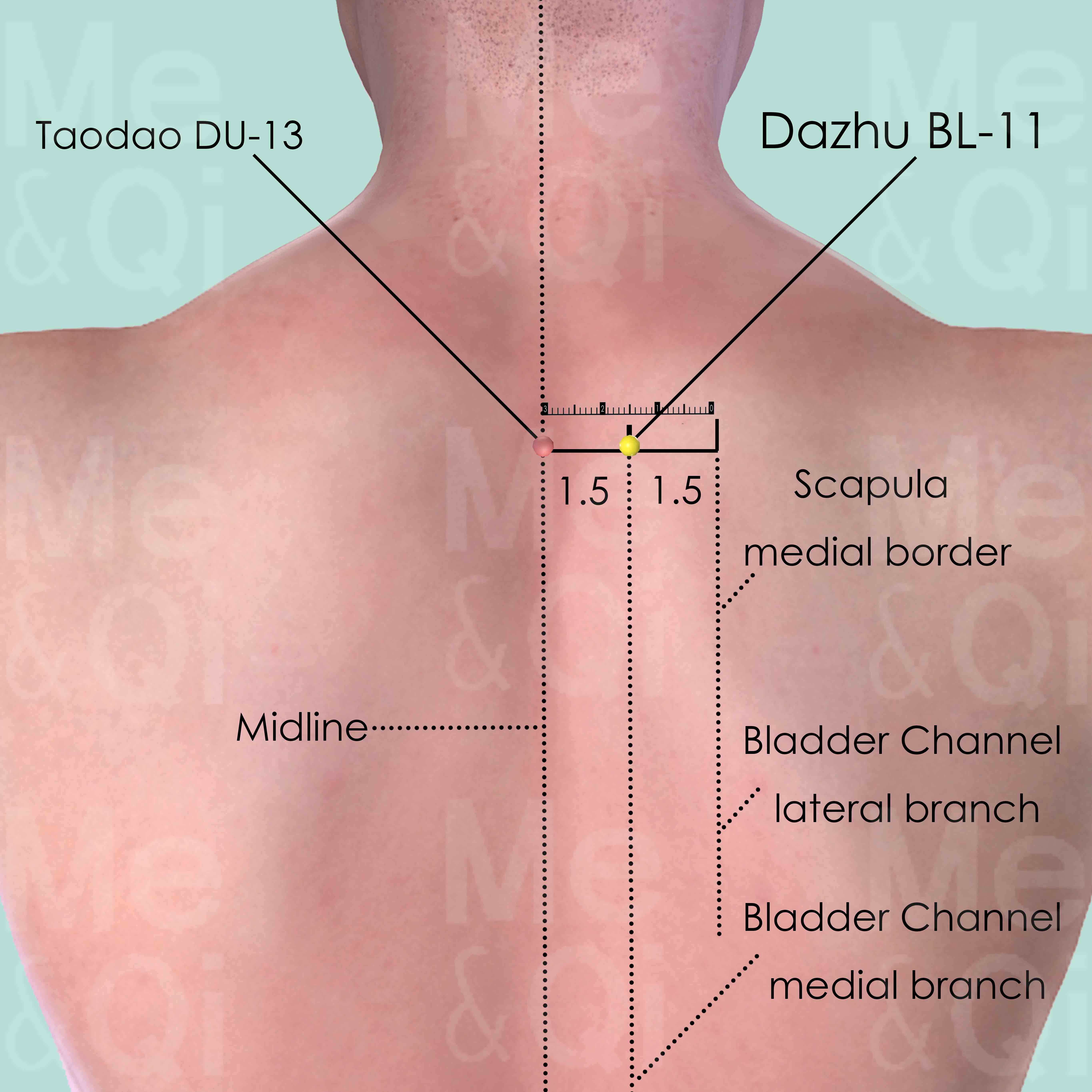
Dazhu BL-11
On the level of the lower border of the spinous process of the 1st thoracic vertebra (T1), 1.5 cun (about 2 finger-breadths) lateral to the posterior midline.
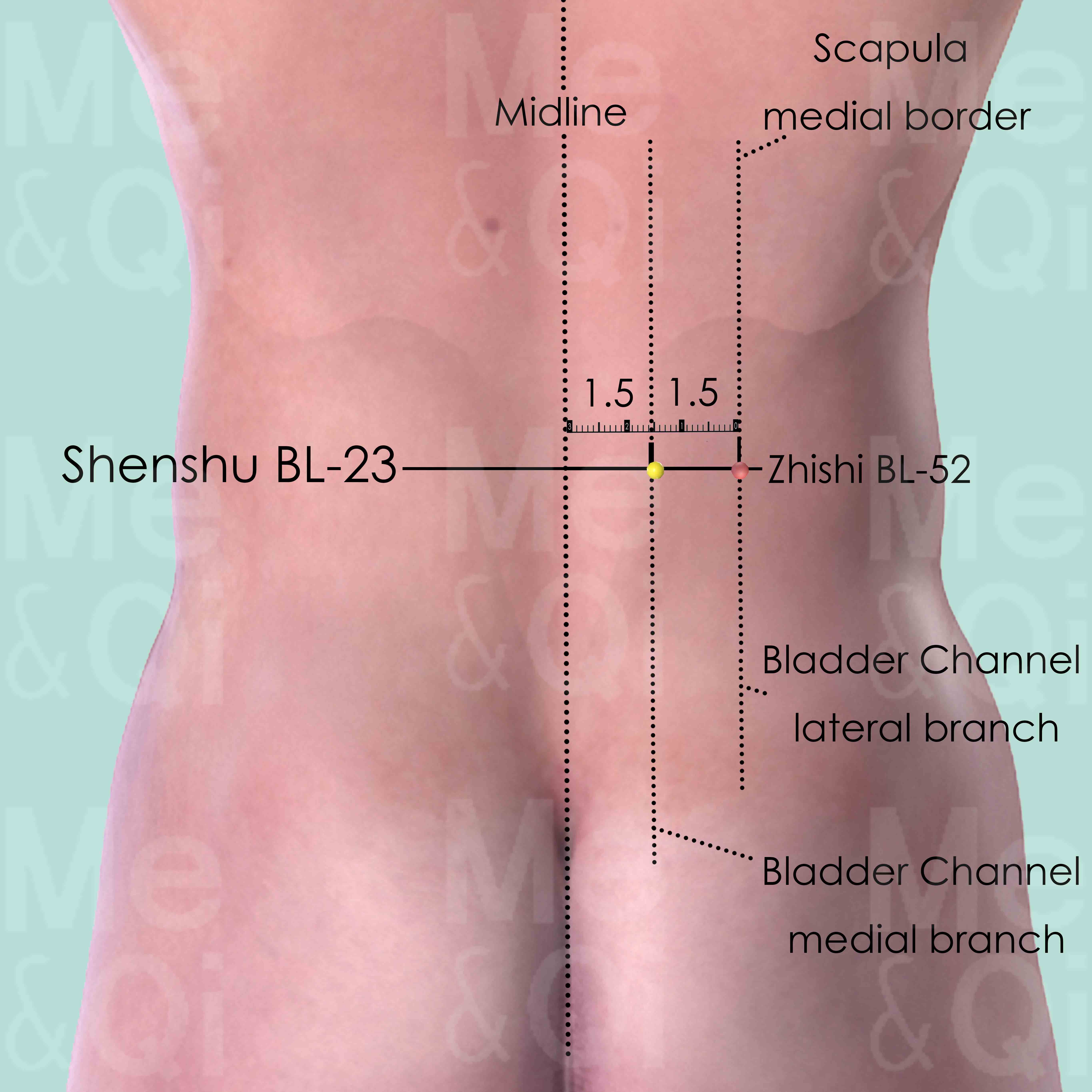
Shenshu BL-23
1.5 cun lateral to the lower border of the spinous process of the 2nd lumber vertebra (L2).
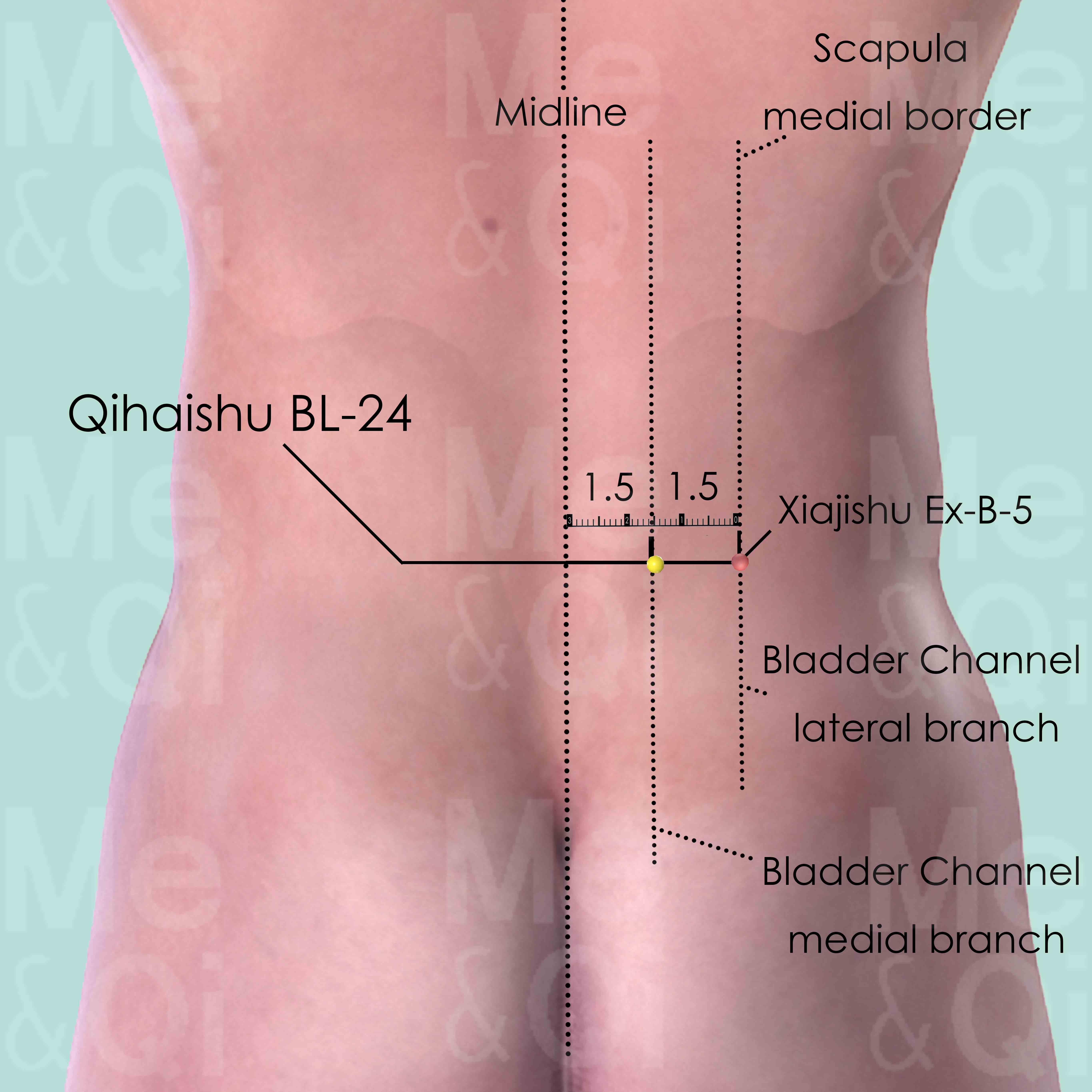
Qihaishu BL-24
1.5 cun lateral to the lower border of the spinous process of the 3rd lumber vertebra (L3).
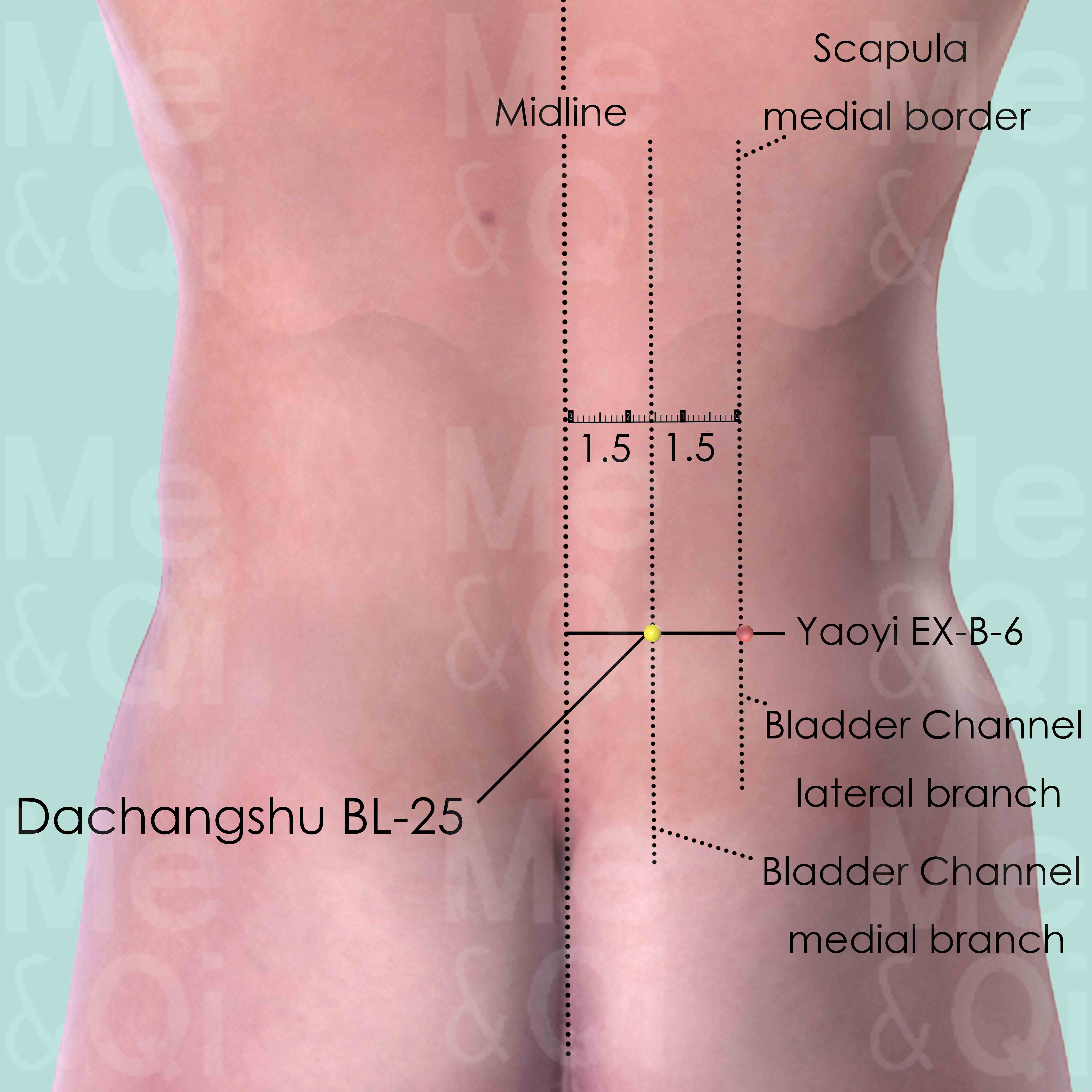
Dachangshu BL-25
1.5 cun lateral to the lower border of the spinous process of the 4th lumber vertebra (L4).
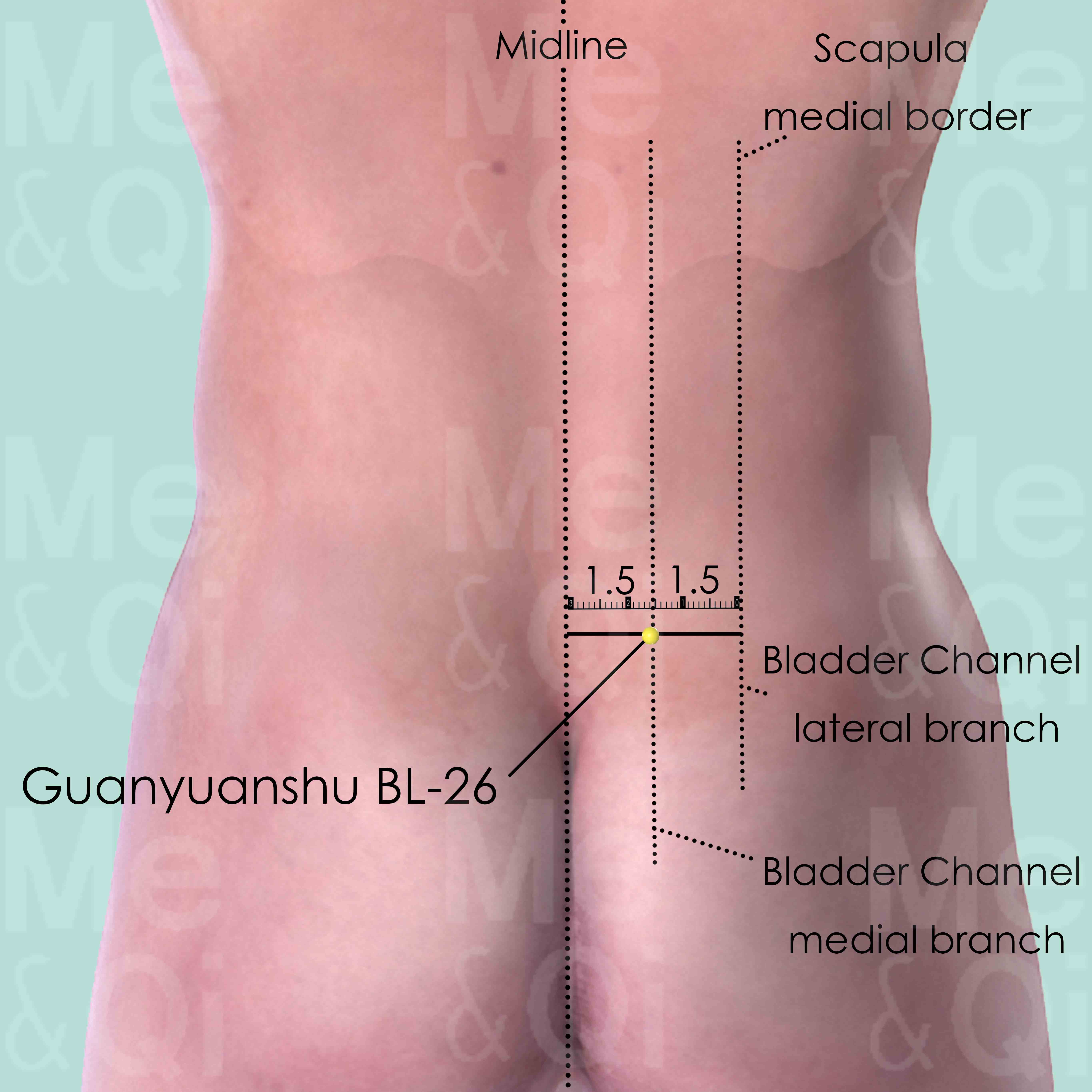
Guanyuanshu BL-26
1.5 cun lateral to the lower border of the spinous process of the 5th lumber vertebra (L5).
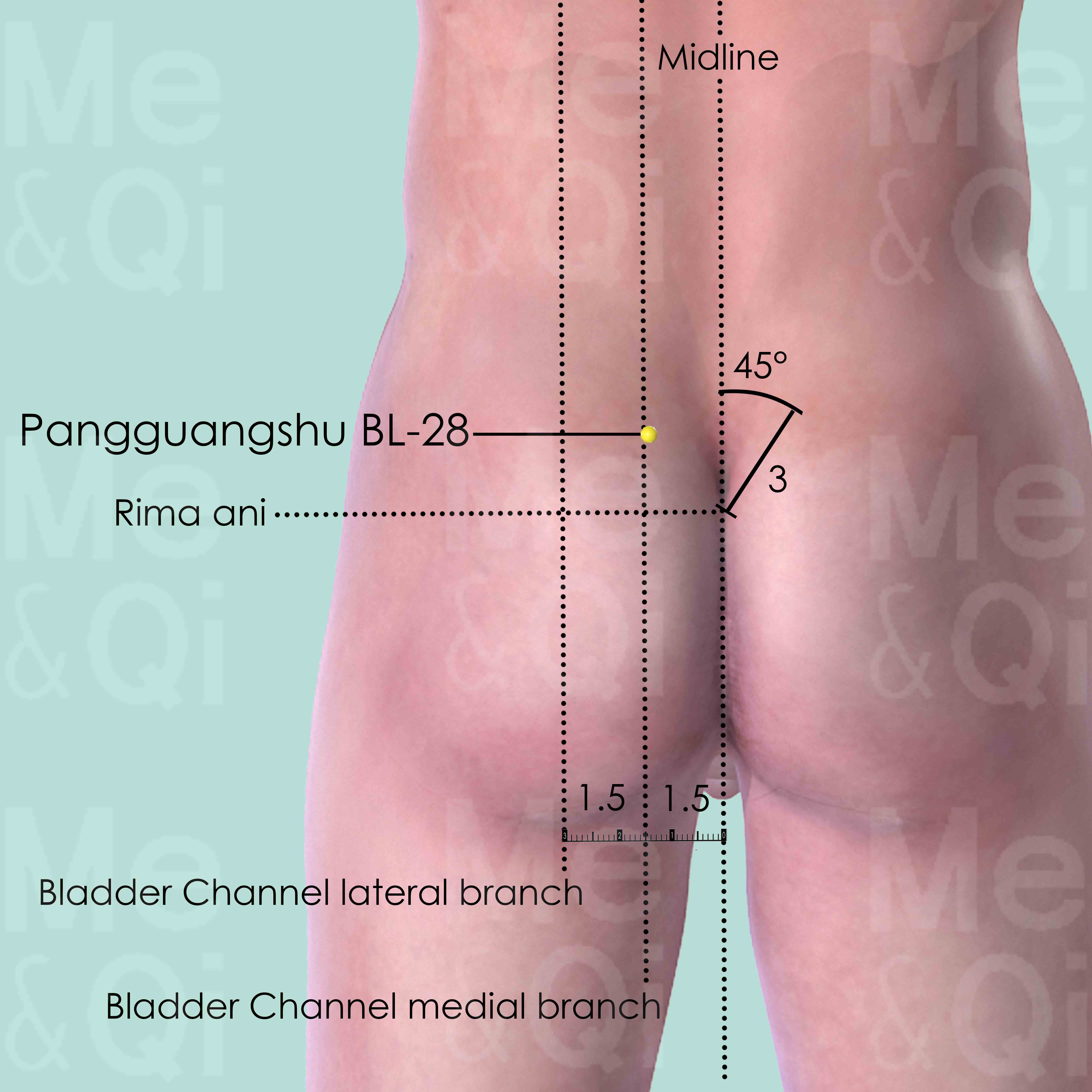
Pangguangshu BL-28
At the level of the 2nd posterior sacral foramen, 1.5 cun lateral to the posterior midline, in the depression between the medial border of the posterior superior iliac spine (PSIS) and the sacrum.
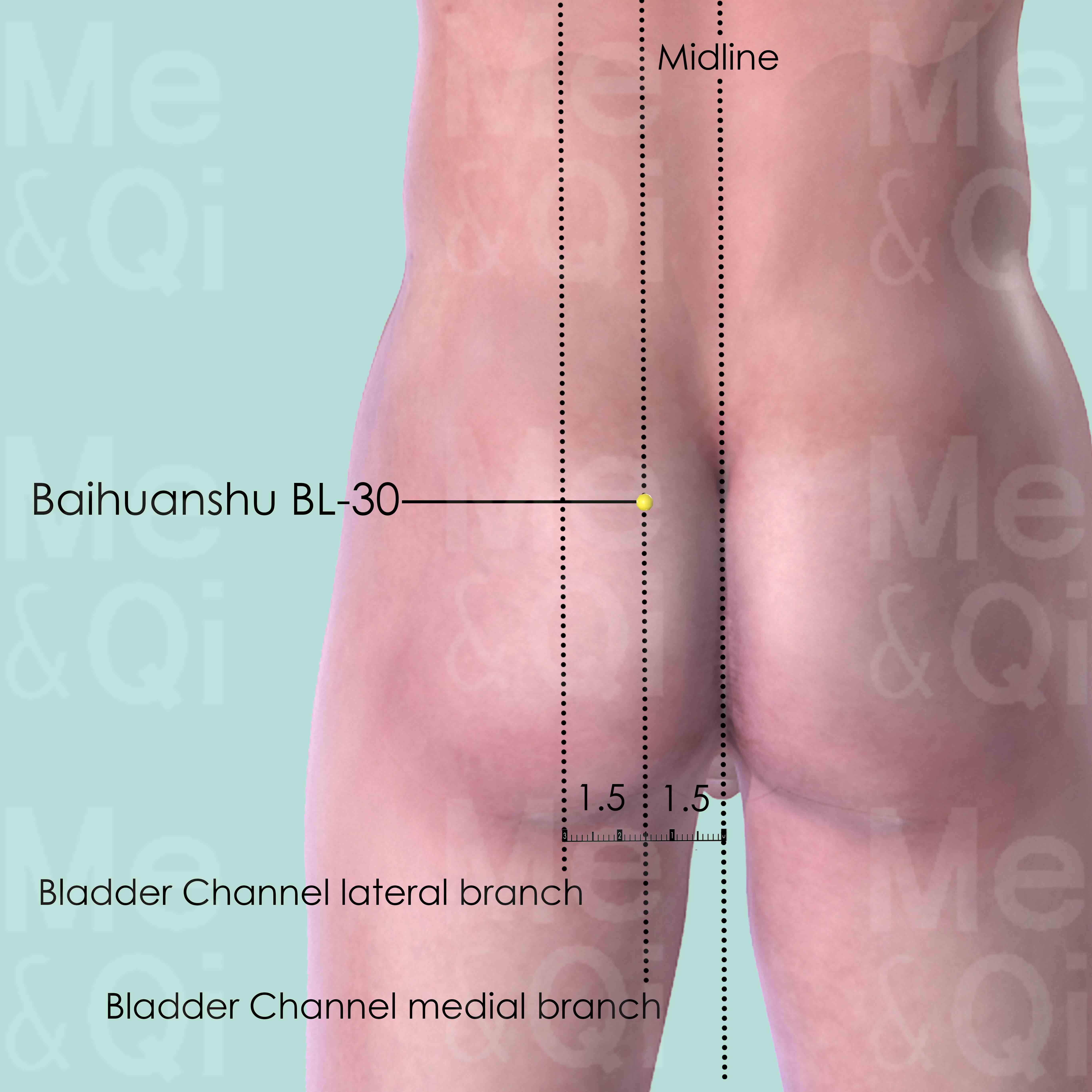
Baihuanshu BL-30
At the level of the 4th posterior sacral foramen, 1.5 cun lateral to the posterior midline.
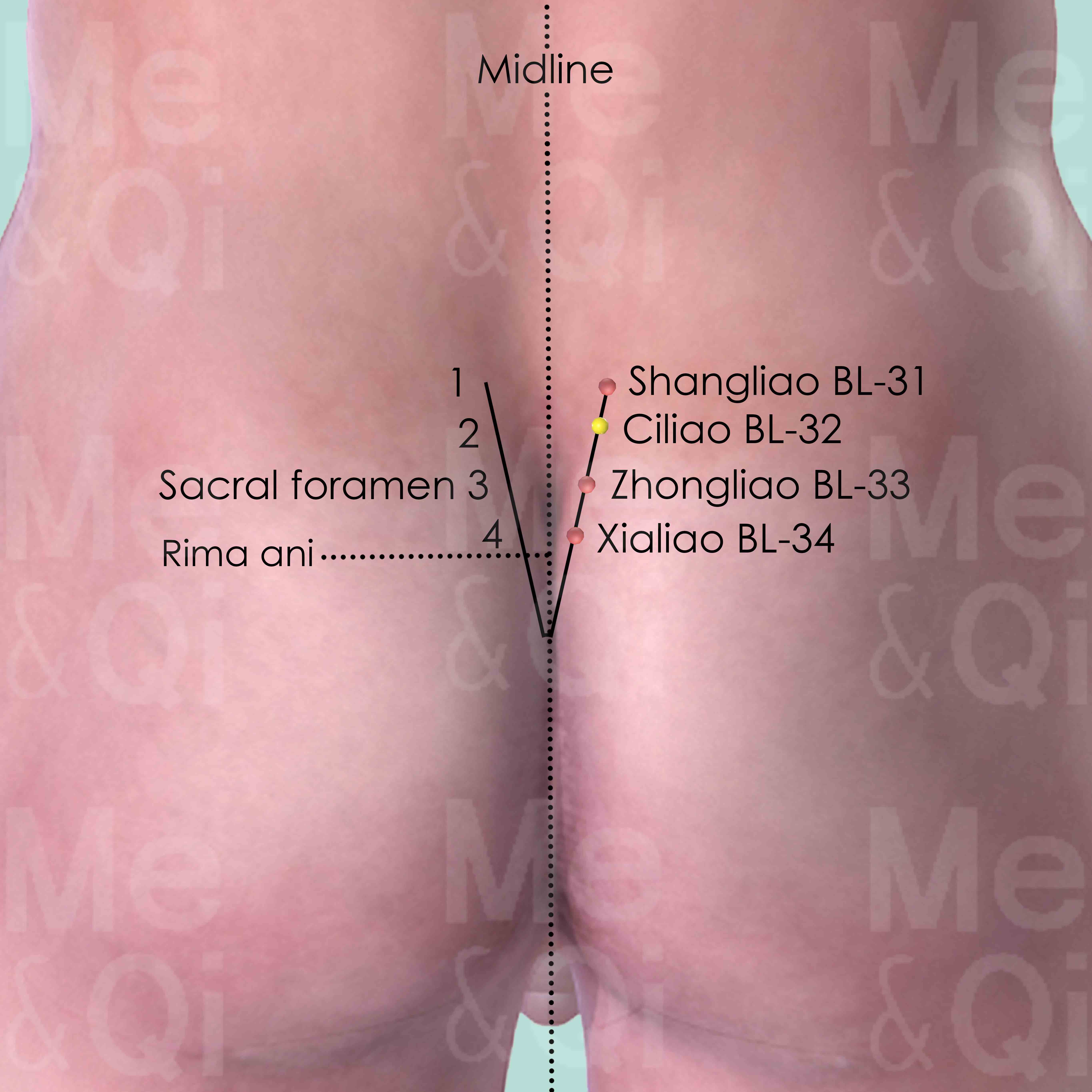
Ciliao BL-32
In the 2nd posterior sacral foramen, about midway between the posterior superior iliac spine (PSIS) and the midline.
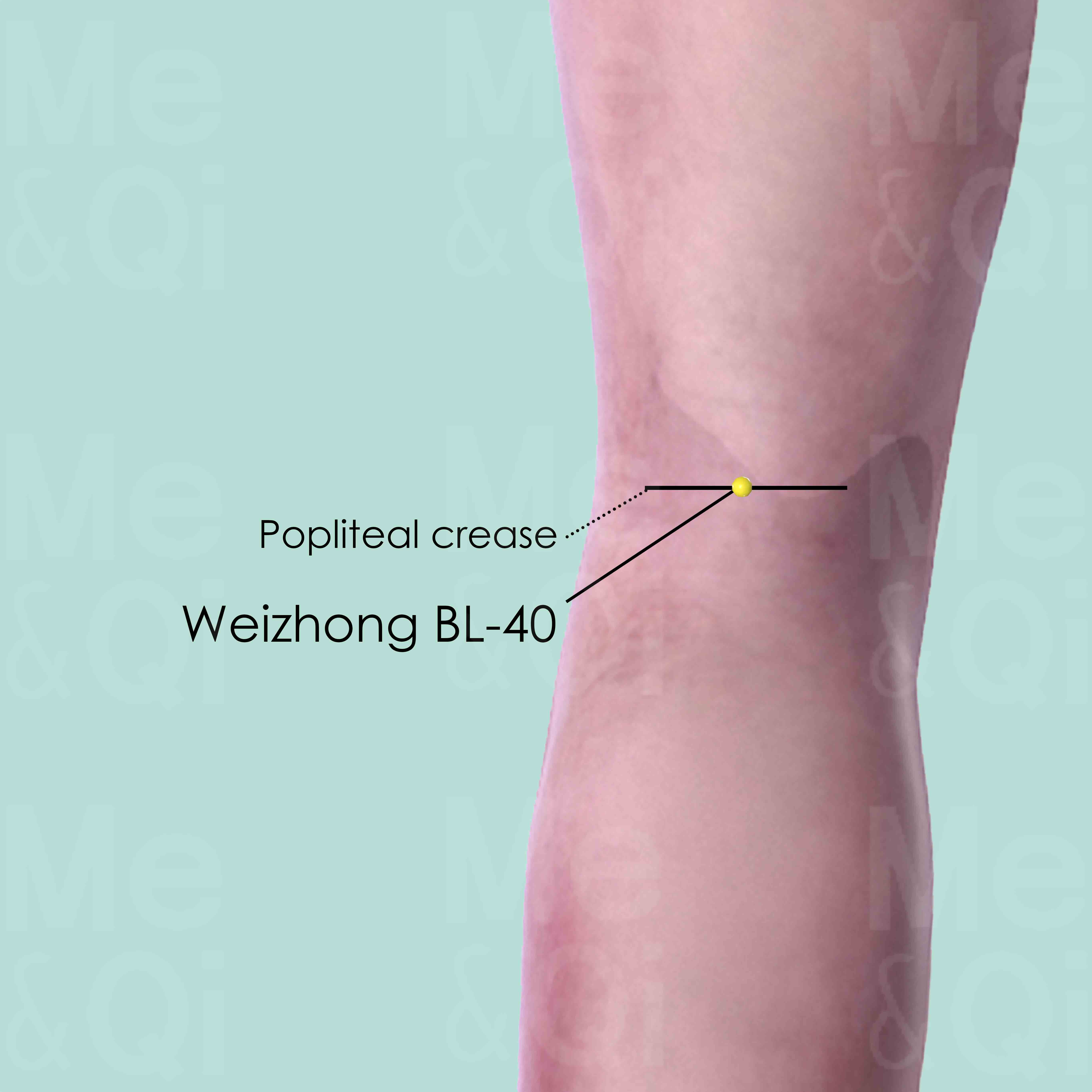
Weizhong BL-40
At the midpoint of the popliteal crease, between the tendons of biceps femoris and semitendinosus muscle.
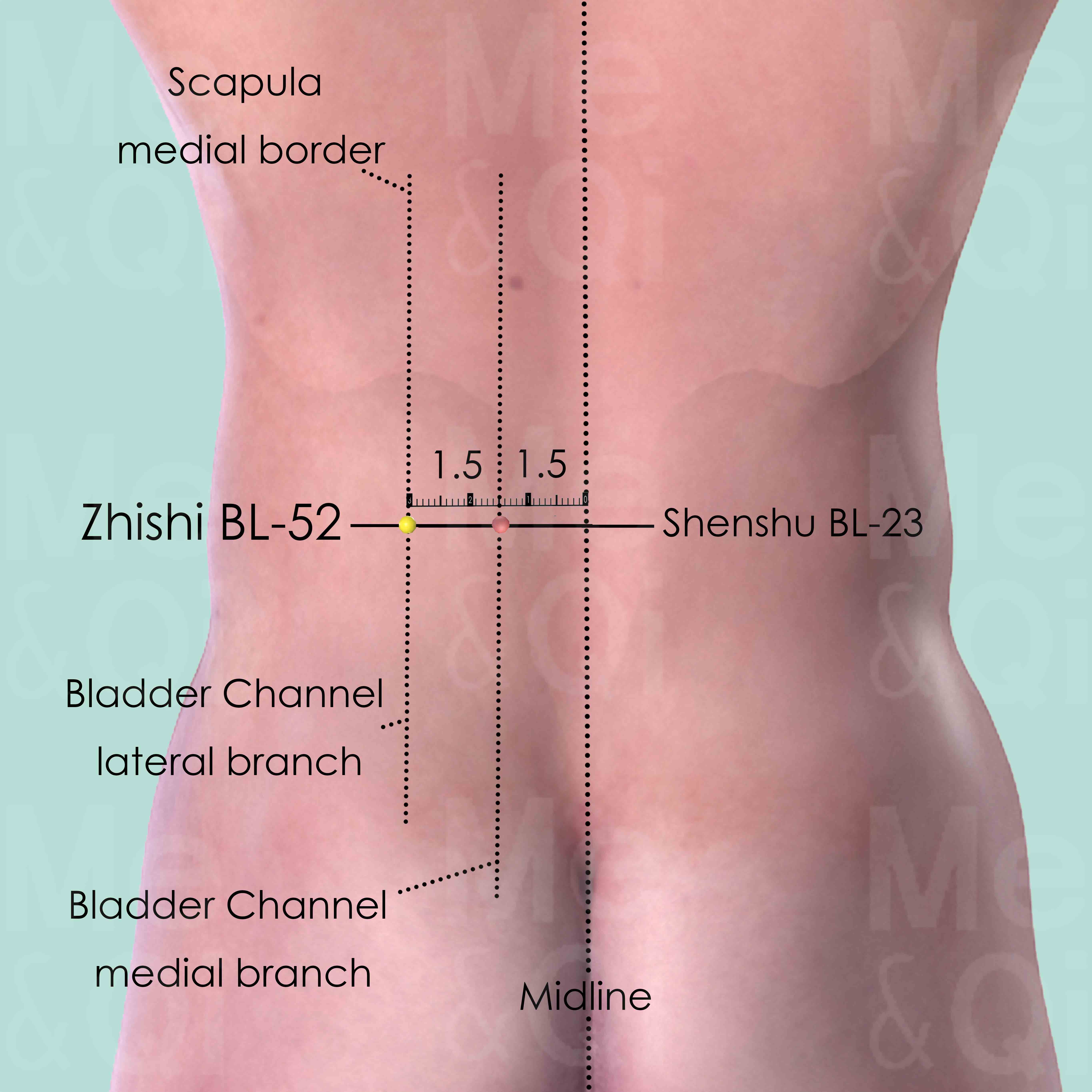
Zhishi BL-52
3 cun lateral to the lower border of the spinous process of the 2nd lumber vertebra (L2).
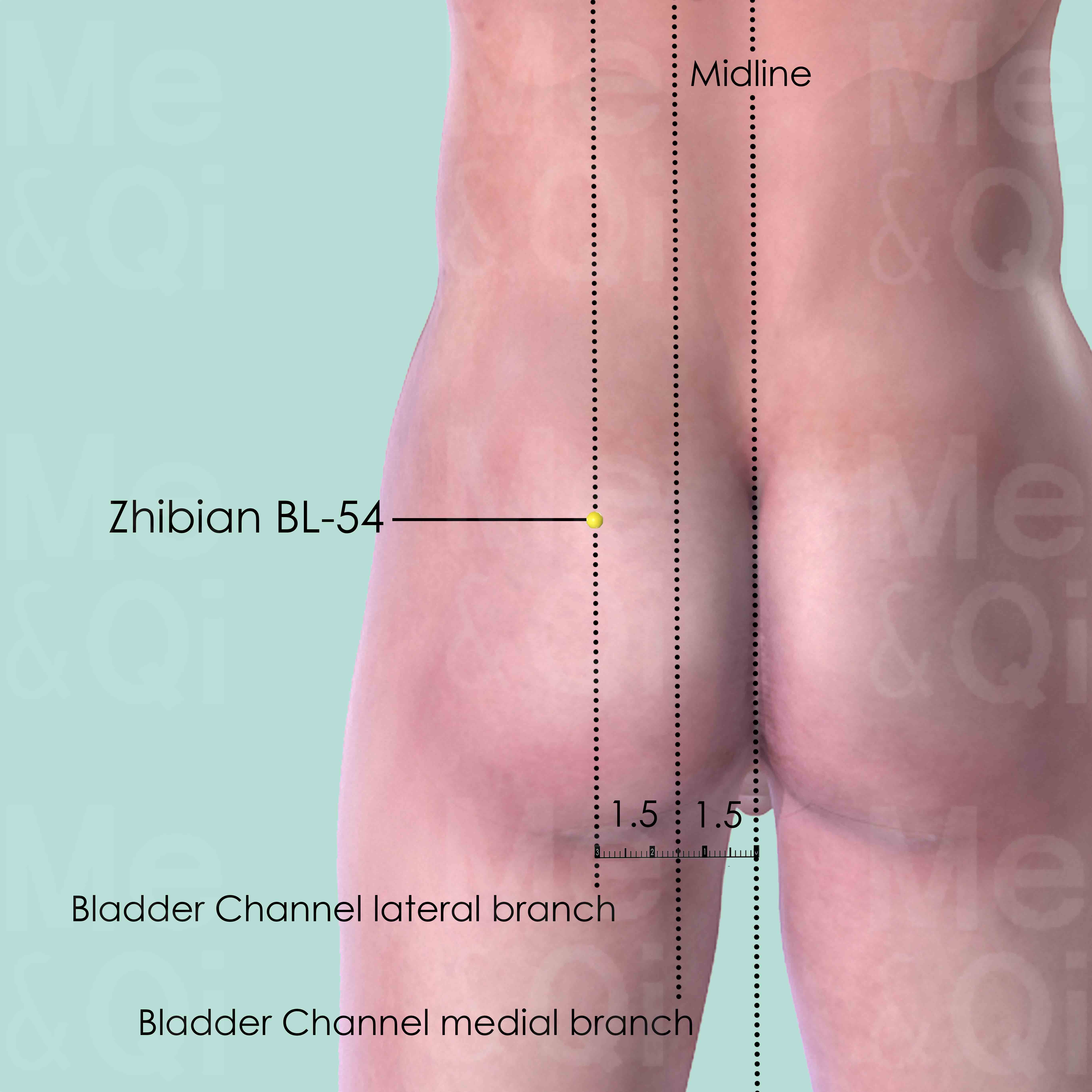
Zhibian BL-54
At the level of the 4th posterior sacral foramen, 3 cun lateral to the posterior midline.
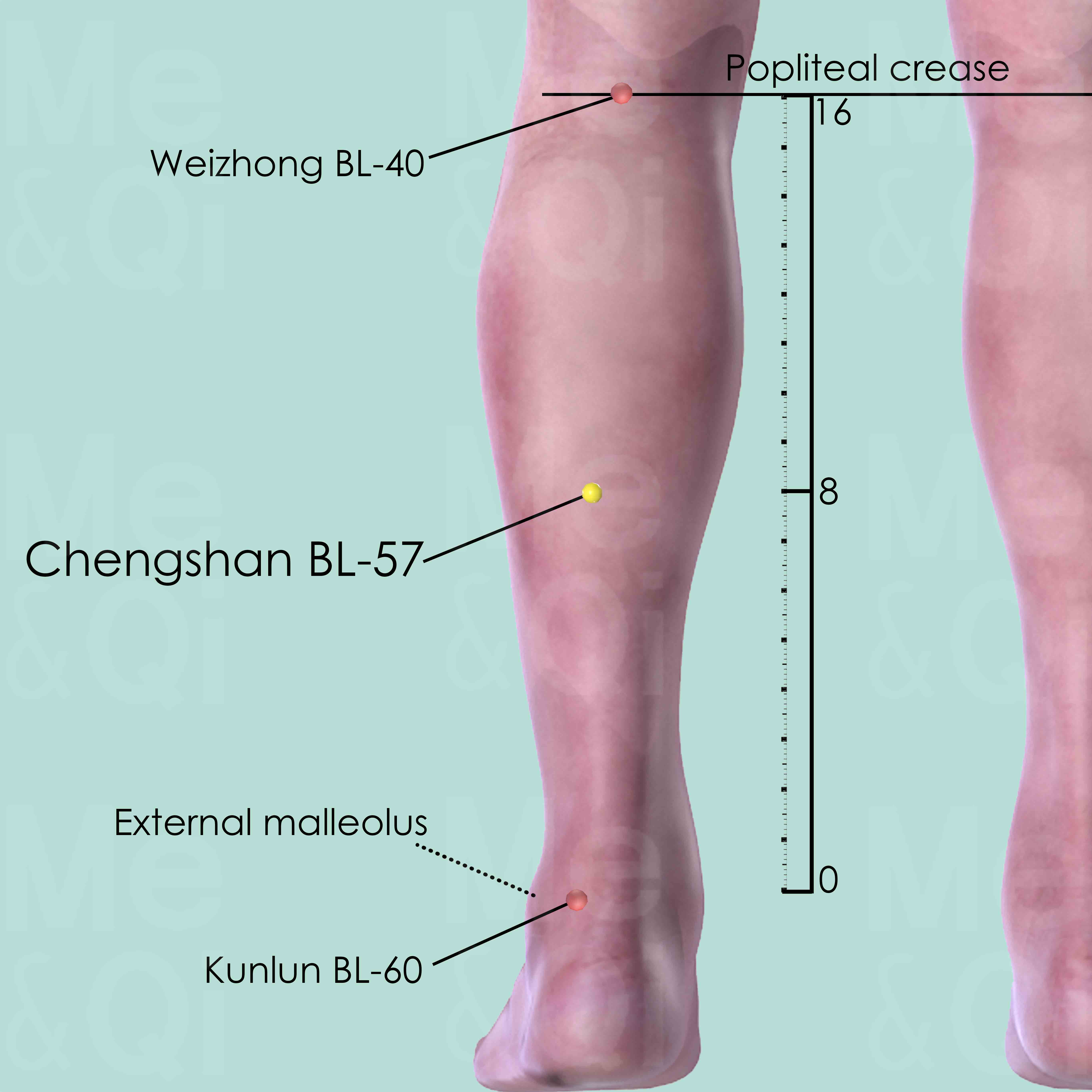
Chengshan BL-57
Directly below the belly of the gastrocnemius muscle and between the two heads of the muscle, on the line connecting Weizhong BL-40 and Kunlun BL-60, about 8 cun below Weizhong BL-40.
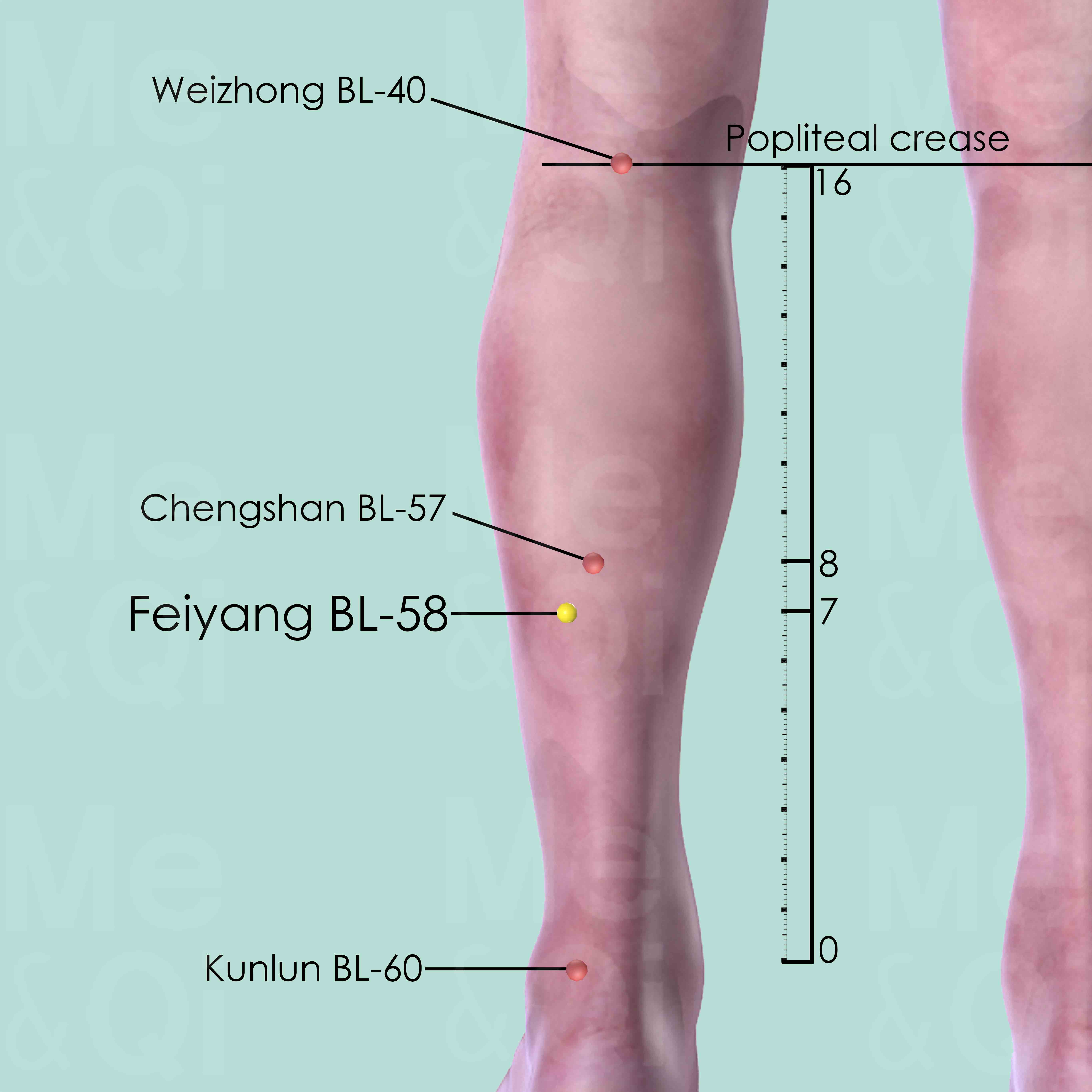
Feiyang BL-58
On the posterior border of fibula, about 1 cun inferior and lateral to Chengshan BL-57, 7 cun directly above Kunlun BL-60.
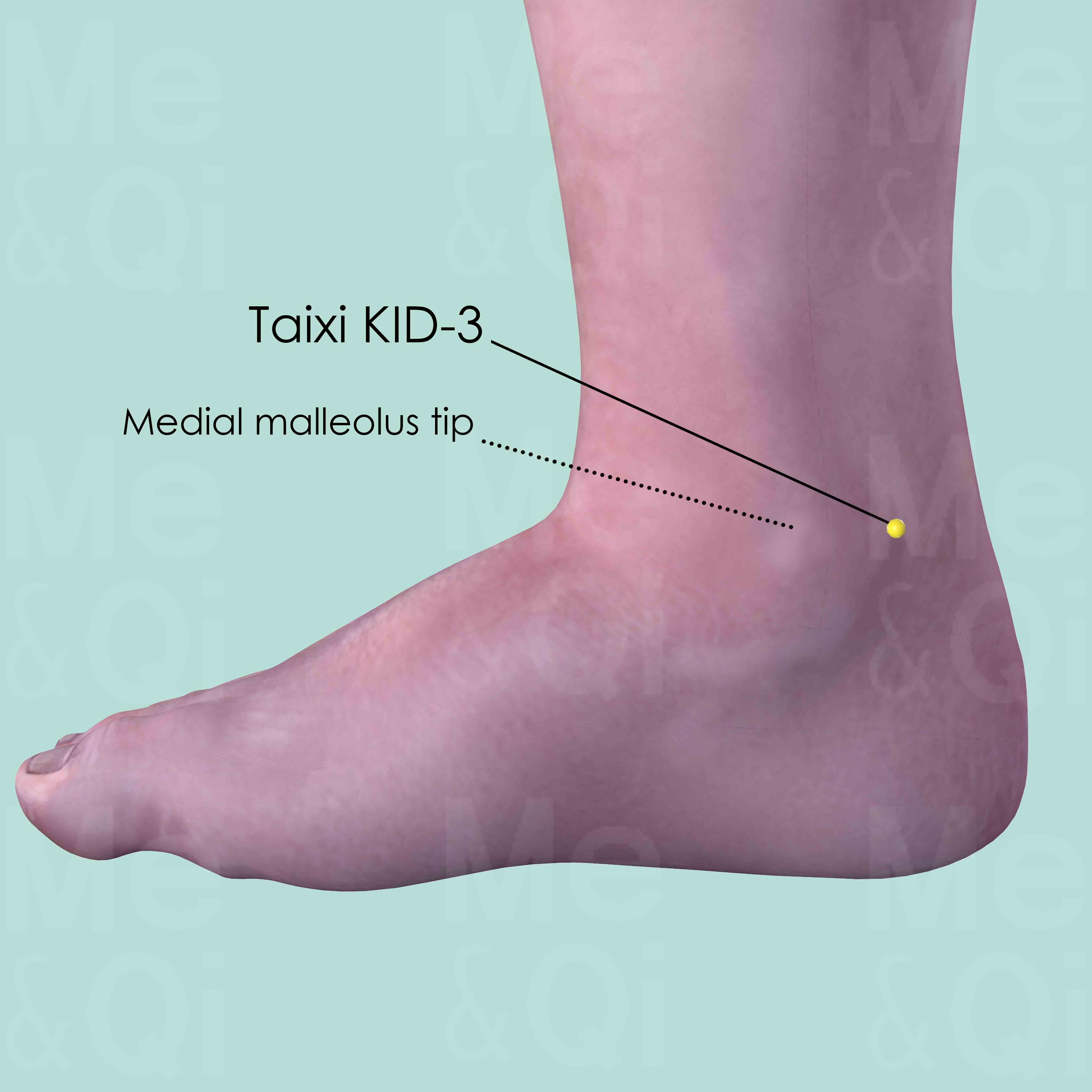
Taixi KID-3
In the depression between the medial malleolus tip and Achilles tendon (Calcaneal tendon), level with the tip of the medial malleolus.
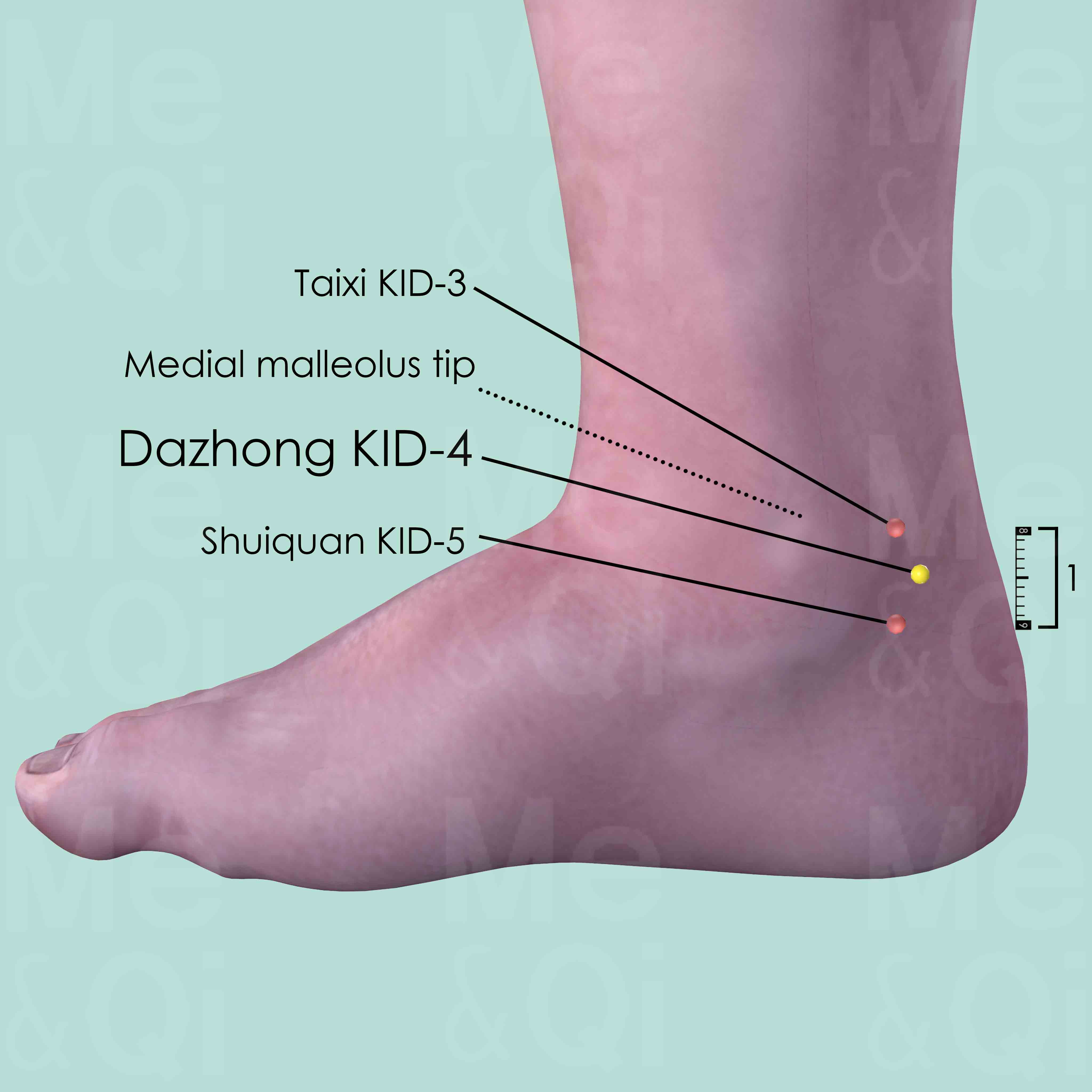
Dazhong KID-4
Posterior and inferior to the medial malleolus, in the depression medial to the Achilles tendon, superior to its insertion at the calcaneus.
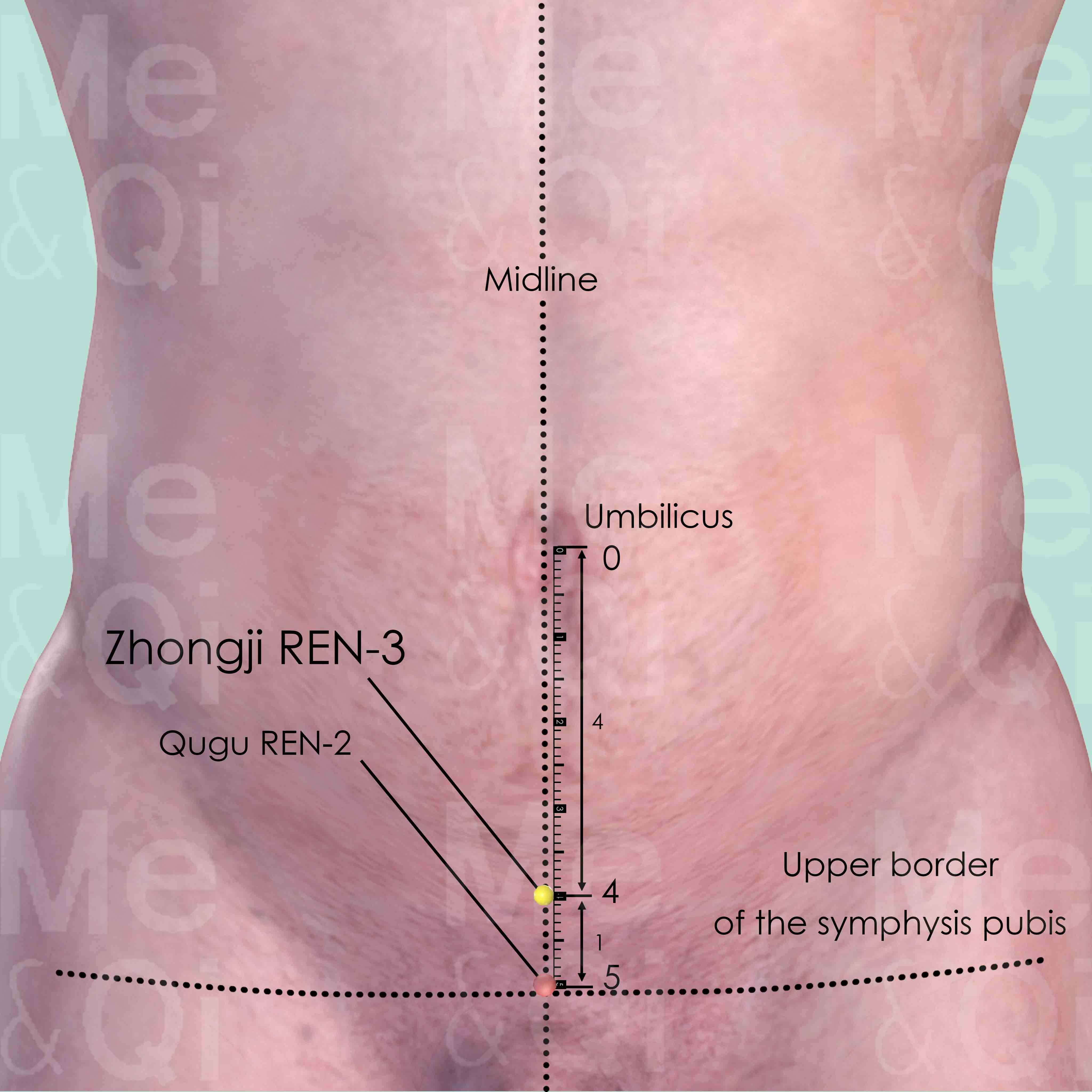
Zhongji REN-3
On the anterior midline, 4 cun below the umbilicus, 1 cun above Qugu REN-2, which is located at the upper border of the symphysis pubis.
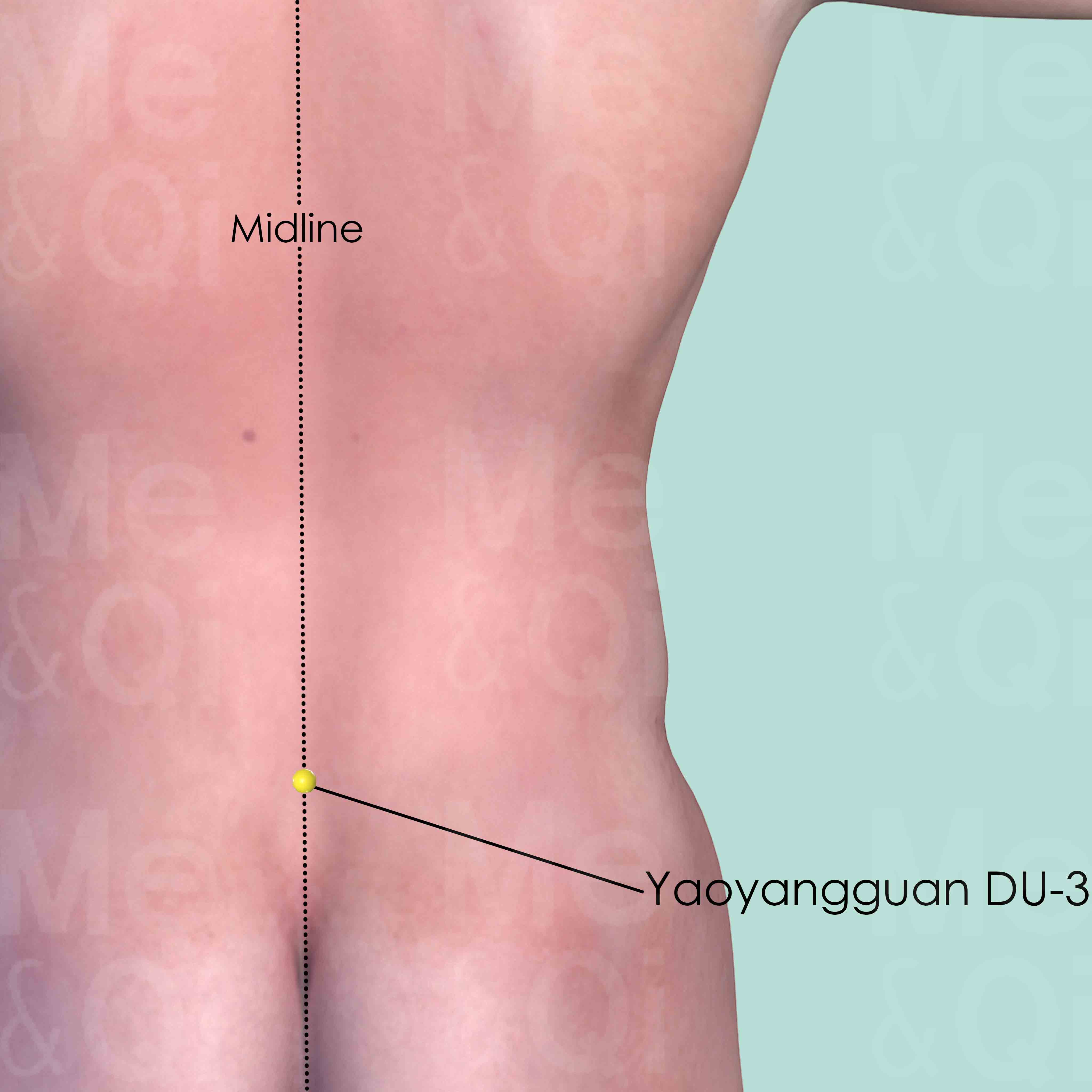
Yaoyangguan DU-3
On the lower back midline, in the depression below the spinous process of the 4th lumber vertebra (L4).
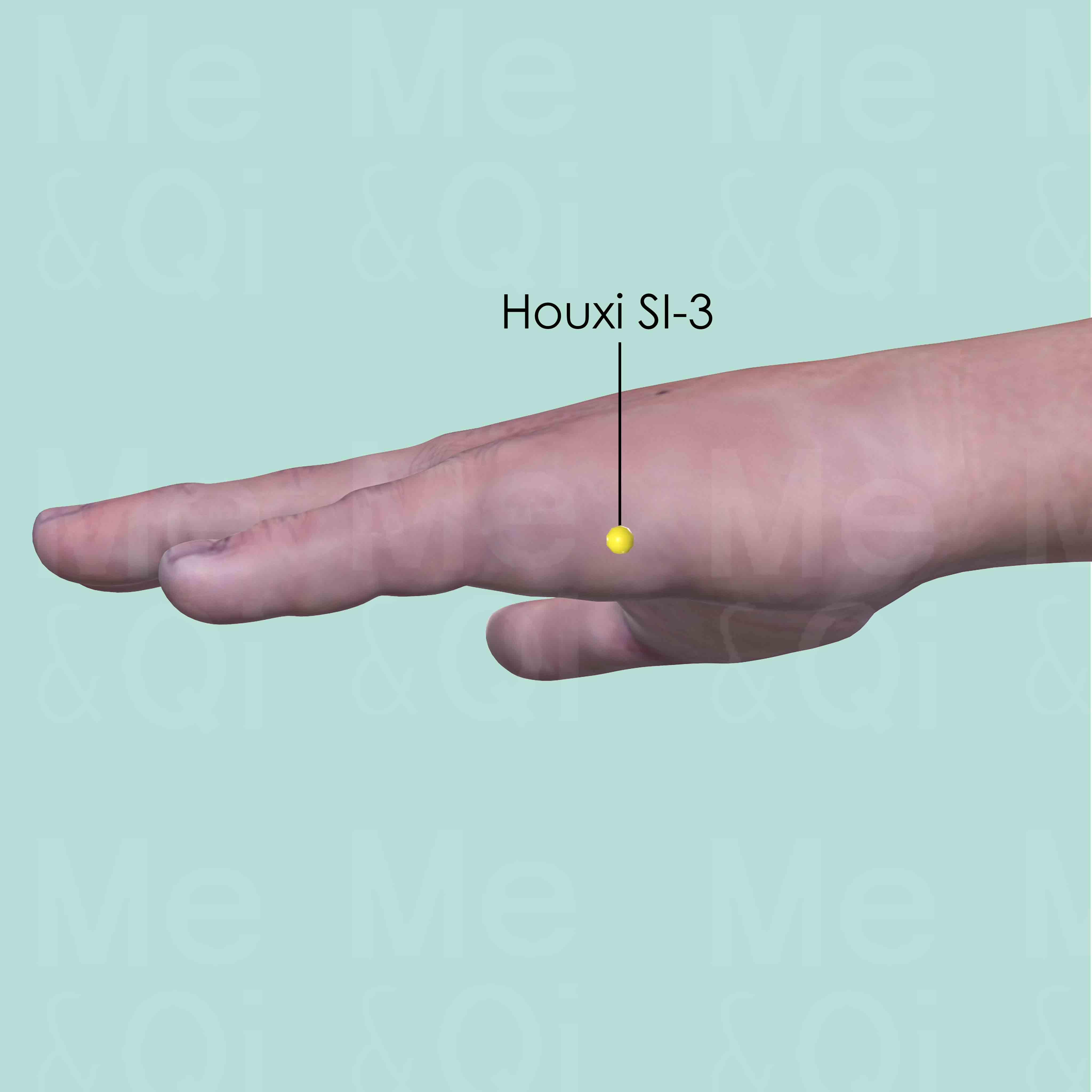
Houxi SI-3
Proximal to the head of the 5th metacarpal bone on the ulnar side, in the depression at the junction of the red and white skin.
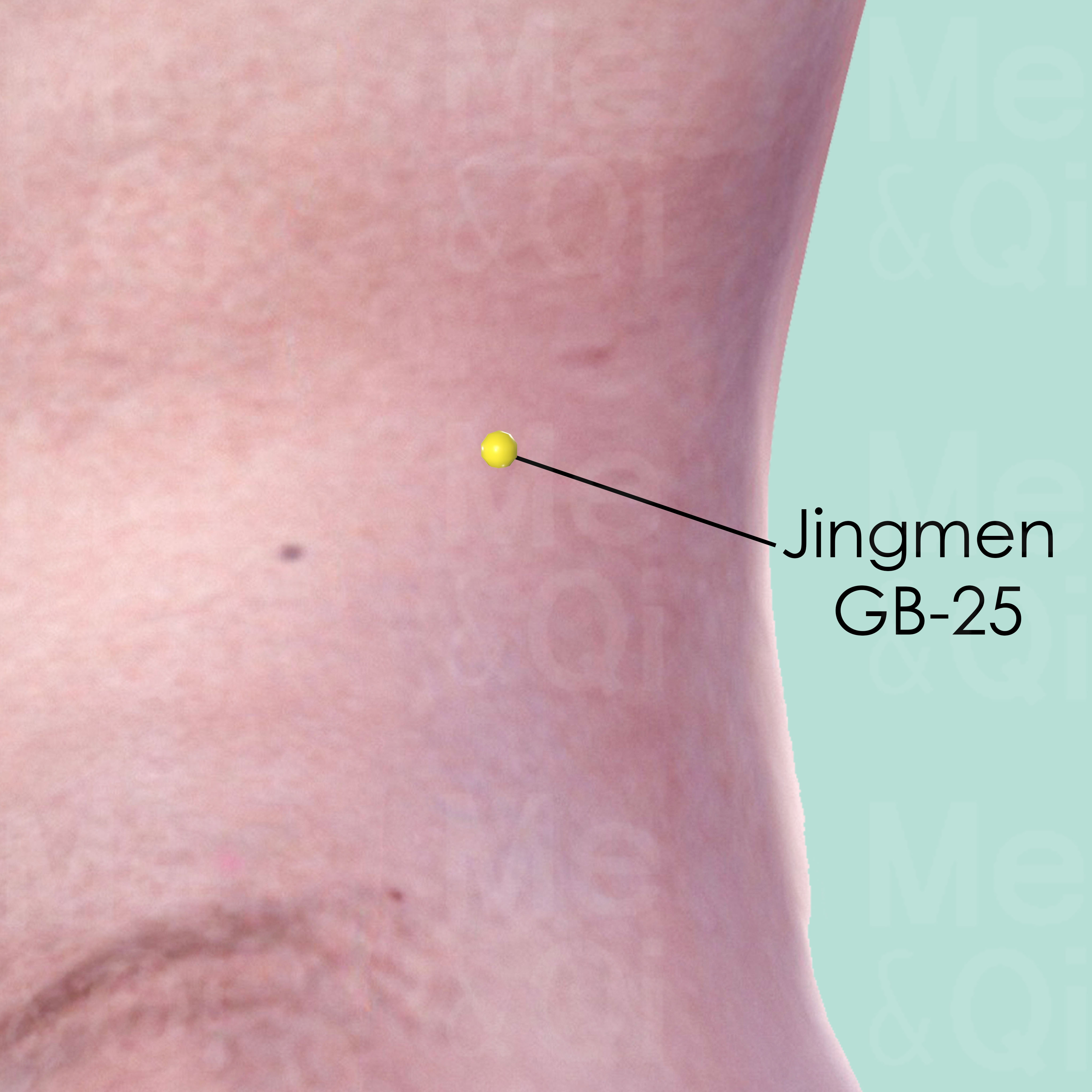
Jingmen GB-25
On the lateral side of the abdomen, on the lower border of the free end of the 12th rib.
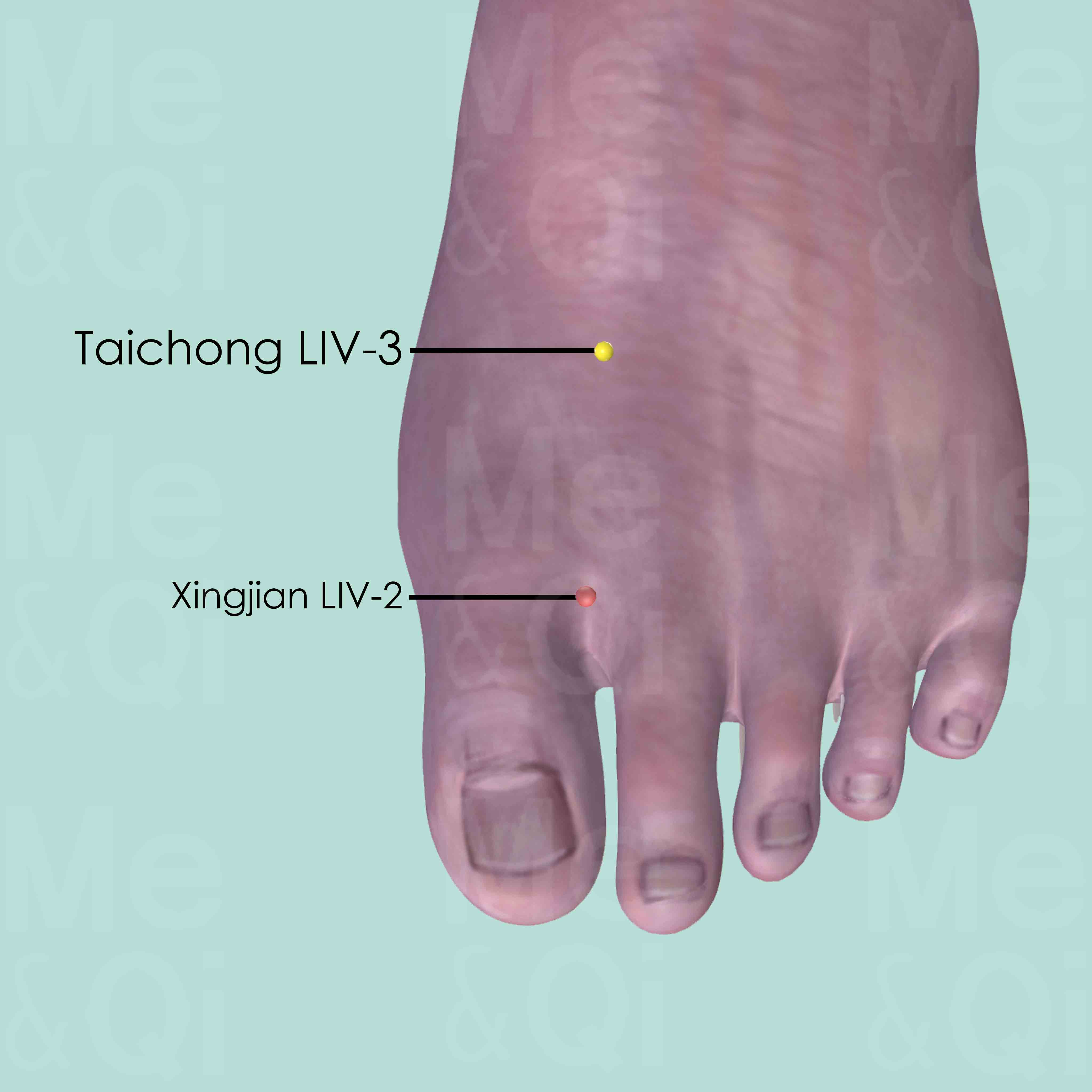
Taichong LIV-3
On the dorsum of the foot, between the 1st and 2nd metatarsal bones, in the depression proximal to the metatarsophalangeal joints and the proximal angle between the two bones.

